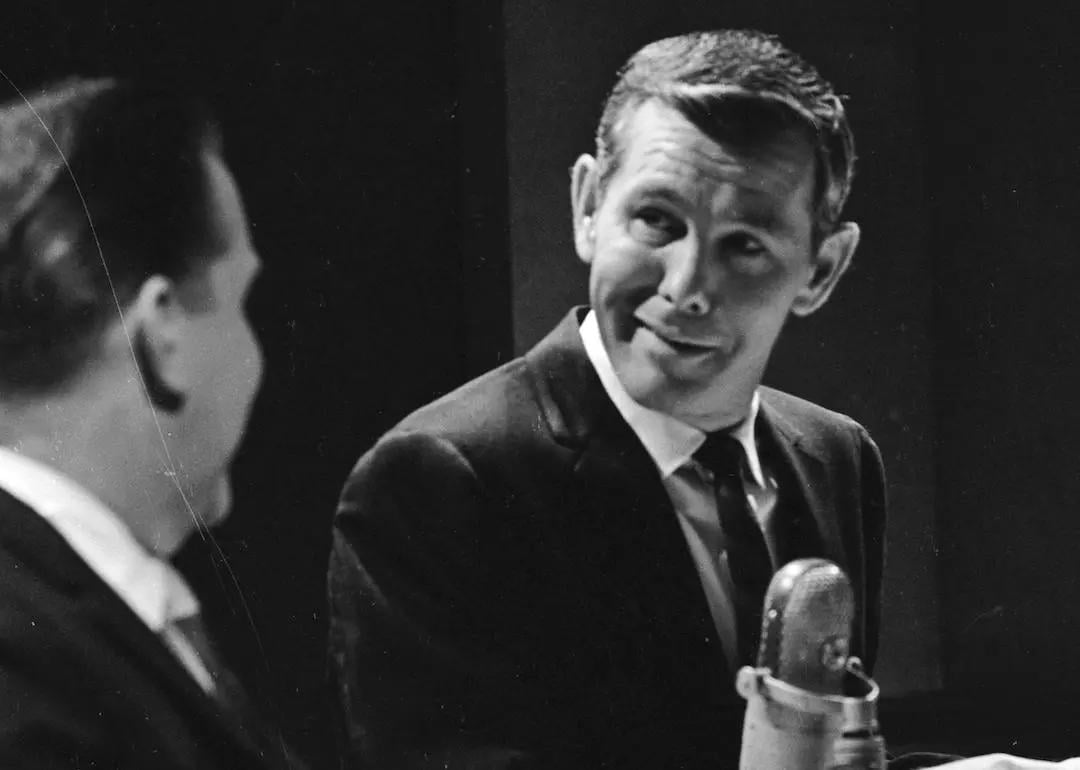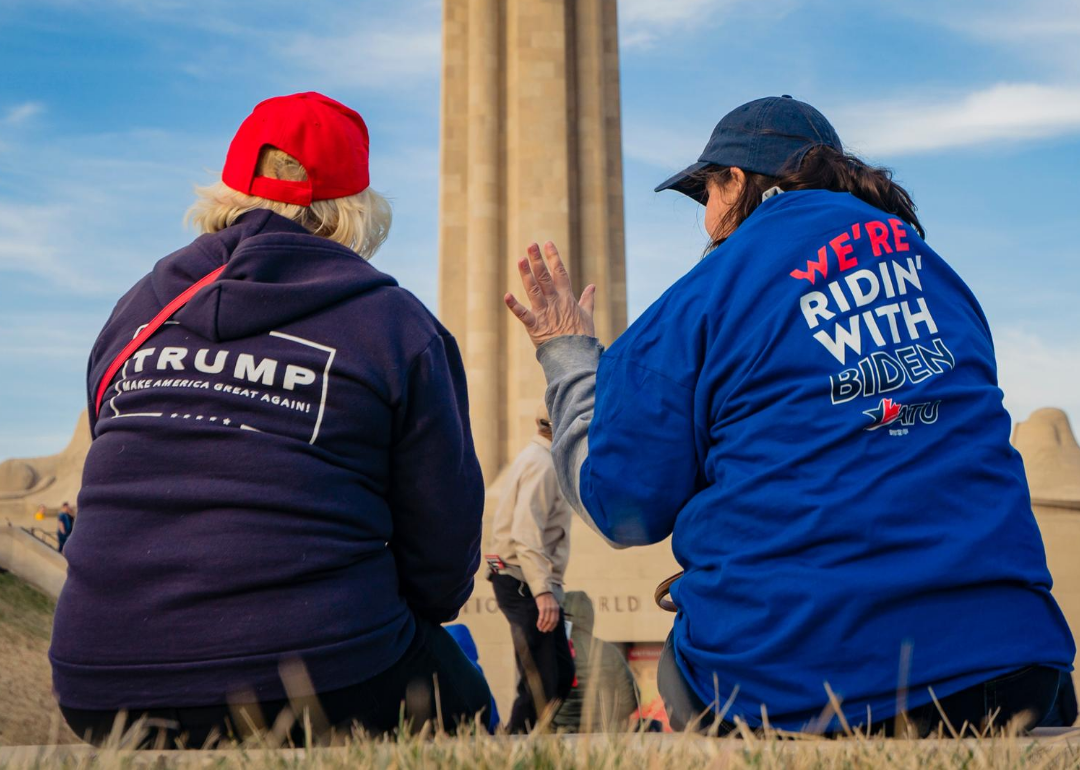
Where Joe Biden and Donald Trump stand on 25 major issues
During every election cycle, politicians and political pundits rush to claim that it's the most important election of their lifetimes, that the future of America hangs in the balance, and that the fate of the nation is at stake. While it's true that all elections are important, the 2020 presidential race feels more like a battle for the soul of America than any other in recent history.
The country is embroiled in three historic crises at the same time. COVID-19, which has infected over 6 million Americans and killed more than 200,000, continues to rage on with no clear end in sight as the country's schools have reopened—and sometimes closed back down—in every state.
One of the side effects of the virus has been an unprecedented economic shutdown that has shuttered hundreds of thousands of businesses, left millions unemployed, and compelled Congress to spend trillions of dollars on direct relief to people and businesses who couldn't survive without government aid.
The backdrop of it all is a national uprising of protests—and occasionally riots met with military force—against institutional racism and police brutality.
The president's response to all three crises is on the ballot, as are his controversial policies on everything from immigration and the Middle East to social media and education. Aside from the historic polarization that has come out of the most divisive presidency in modern history are the more familiar wedge issues like abortion, gun control, and religious freedom versus civil and gay rights.
Using a variety of sources, including news reports, studies, political analyses, and the candidates' own policy position statements on their campaign websites, Stacker compiled a list of 25 of the most significant issues of the day and where President Donald Trump and former Vice President Joe Biden stand on them.
Here's what readers need to know about each candidate's position before they head to the ballot box on Nov. 3.
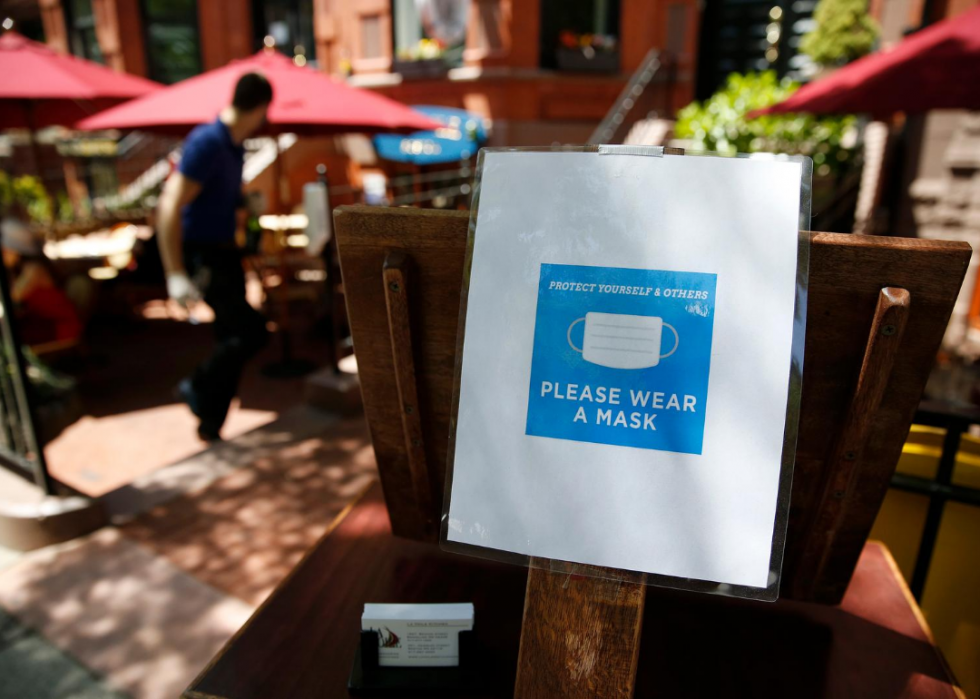
Joe Biden: Reopening the economy
Biden has proposed an eight-point plan for reopening the economy. It involves guaranteed testing to all workers, as well as guaranteed paid sick leave to all those who fall ill. The plan also calls for a national contact tracing network, special protections for older Americans, a “Safe for Shoppers” program, and a program that supports schools and child care.
[Pictured: Boston on June 8, 2020 during the first day of Phase 2 of reopening.]
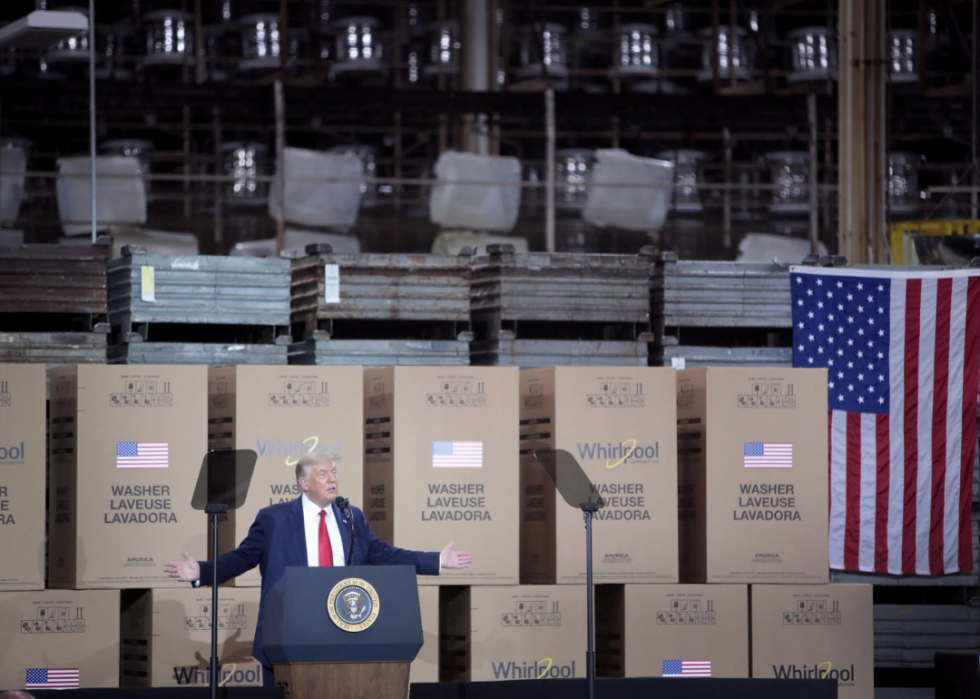
Donald Trump: Reopening the economy
As early as April, President Trump insisted on reopening the economy in full with limited exceptions, despite advice to the contrary from top health officials, a dramatic spike in the coronavirus cases, and the absence of a national testing strategy. The White House’s web page dedicated to the issue implies that the reopening has already happened and has happened successfully, stating that, “The economy has come roaring back to life under President Trump.”
[Pictured: Donald Trump speaks to workers at a Whirlpool manufacturing facility on Aug. 6, 2020 in Clyde, Ohio.]
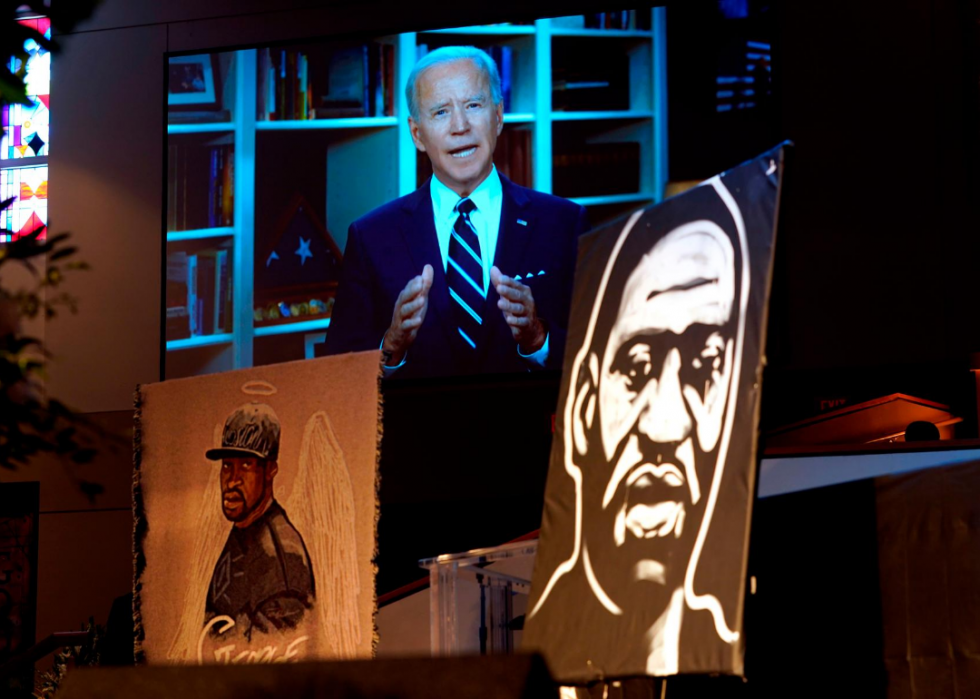
Joe Biden: Police reform
Despite repeated and public claims by President Trump to the contrary—not to mention a $20 million ad campaign—Joe Biden has not called for defunding the police. According to FactCheck.org, Biden stated that while he does “not believe that federal dollars should go to police departments violating people’s rights or turning to violence as the first resort, I do not support defunding the police. The better answer is to give police departments the resources they need to implement meaningful reforms, and to condition other federal dollars on completing those reforms.”
[Pictured: Joe Biden speaks via video link as family and guests attend the funeral service for George Floyd on June 9, 2020, in Houston.]
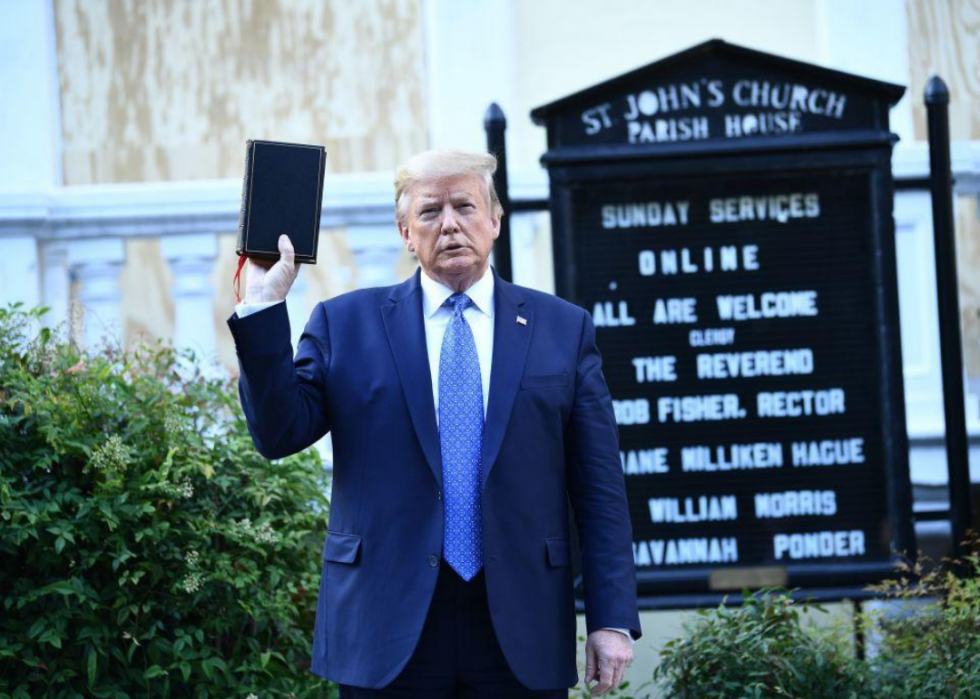
Donald Trump: Police reform
Amid widespread national unrest over police excess, Trump has positioned himself squarely as the “law and order” president. While hailing law enforcement, he signed an executive order outlining the White House’s priorities for police reform. It fell short of the reforms sought by a Democratic House bill, but it included the creation of a national police misconduct database, new use-of-force guidelines, and a larger role for social workers.
[Pictured: Donald Trump holds up a bible in front of St John's Episcopal in Washington D.C. on June 1, 2020.]
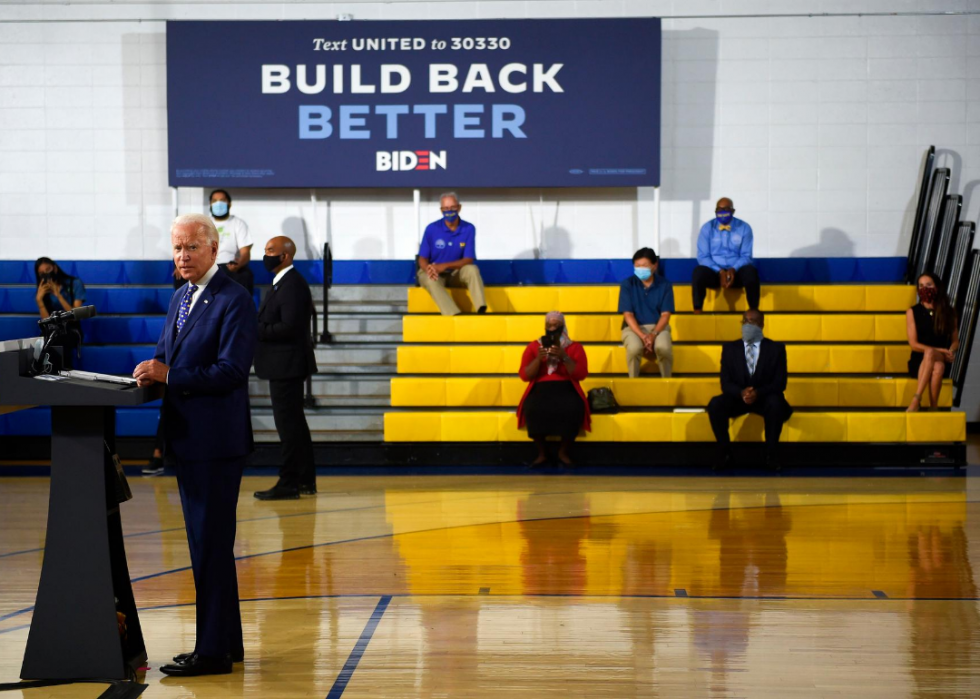
Joe Biden: Racial justice
Joe Biden's platform for racial justice is directly tied to his platform for reopening the economy, as he has stated that economic equality must be at the heart of any move toward racial equality. His "Build Back Better" agenda includes a 26-page plan for increasing resources for minority entrepreneurs, reforming "opportunity zones," and addressing racial disparities in housing and homeownership. In terms of symbolic measures, he has said that Confederate statues belong not in public squares, but in museums.
[Pictured: Joe Biden speaks during a campaign event at the in Wilmington, Delaware, on July 28, 2020.]
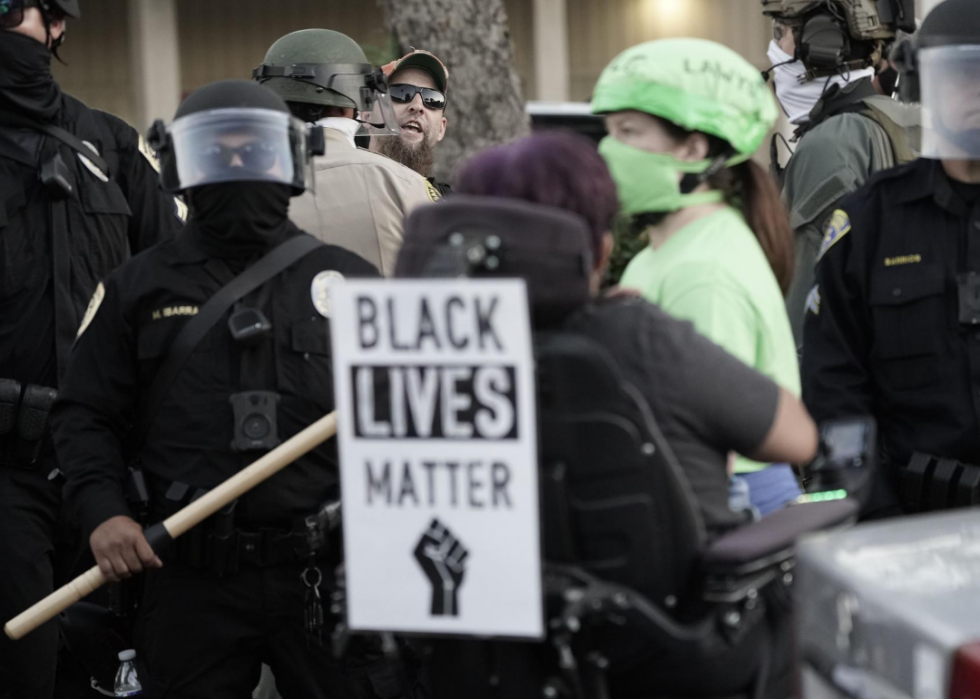
Donald Trump: Racial justice
President Trump has claimed publicly and repeatedly that “nobody has done more for Black Americans than I have,” according to Business Insider—when asked about his commitment to racial justice, he frequently pivots to touting minority unemployment statistics before the coronavirus shutdown. In reality, he stoked racial animosity from the outset of his campaign, refused initially to criticize white supremacists at Charlottesville, Virginia, denounced the Black Lives Matter movement, and castigated even peaceful racial justice protestors as “terrorists,” “criminals,” “anarchists,” and “angry mobs.” He has defended Confederate statues and symbols, come out strongly against renaming military installations named for Confederate generals, and, most recently, refused to attend memorial services for civil rights icon John Lewis.
[Pictured: A far-right militia member of the Three Percenters shouts behind police lines towards Black Lives Matter demonnstrators protesting against racial injustice in La Mesa, California, on Aug. 1, 2020.]

Joe Biden: LGBTQ+ rights
Although he voted for the 1996 Defense of Marriage Act, Vice President Joe Biden beat his boss to the punch when he came out in favor of same-sex marriage several days before Barack Obama in 2012. Biden’s official policy web page touts the great strides the LGBTQ+ community made during the Obama presidency and pledges a commitment to extending that progress if he should be elected. His policy outline includes reforms and protections in areas like workplace and housing discrimination, the military, health care, and youth initiatives.
[Pictured: A man raises a fist while marching along the parade route during the San Francisco Pride parade.]
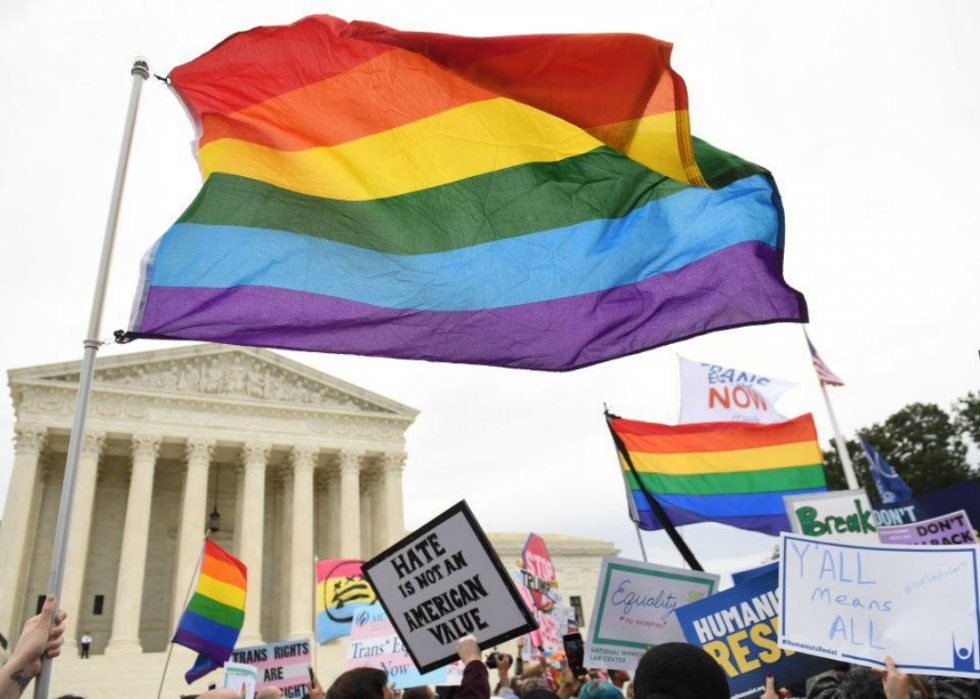
Donald Trump: LGBTQ+ rights
The White House’s official position is that President Trump is committed to equality, justice, and fair treatment for the LGBTQ+ community—it often highlights its initiatives to combat global AIDS as evidence. That posturing is at odds with the reality of his administration’s record, which, according to the Human Rights Campaign, includes nearly three dozen actions to weaken or remove protections and freedoms for the LGBTQ+ community. They include supporting employment discrimination, banning transgender and HIV-positive individuals from military service, opposition to the widely popular Equality Act, and banning U.S. embassies around the world from flying rainbow flags during Pride Month.
[Pictured: Demonstrators in favor of LGBTQ+ rights rally outside the U.S. Supreme Court in Washington D.C., Oct. 8, 2019.]
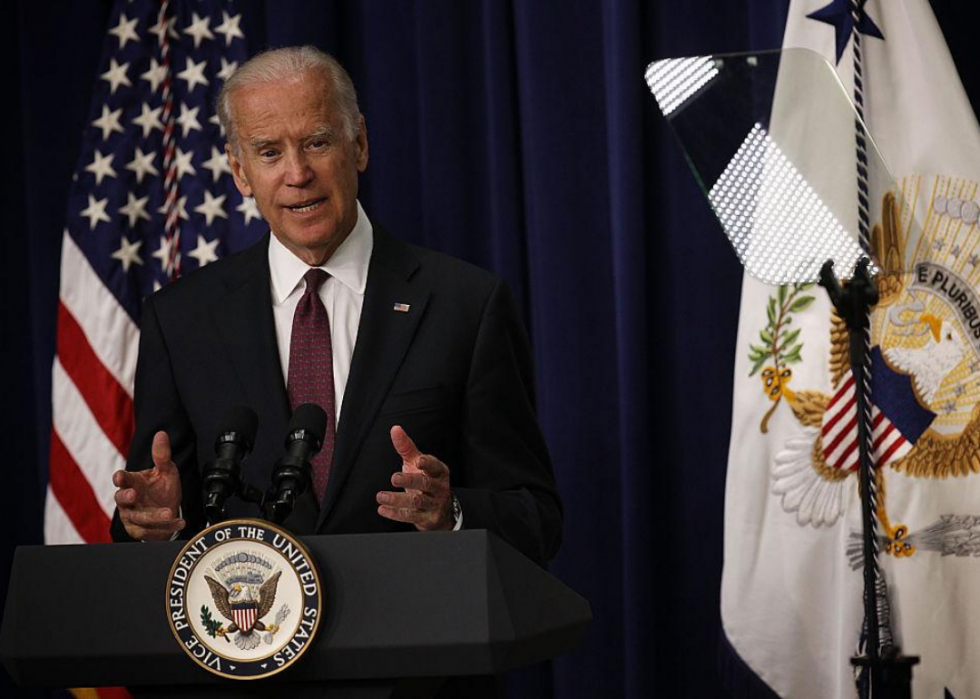
Joe Biden: Climate change
Joe Biden has stated that he sees global warming as both an immediate and serious threat and an opportunity to create jobs through a massive overhaul of America’s infrastructure and the widespread introduction of green and renewable energy. He recently outlined a $2 trillion plan to set the country on a path to net-zero emissions by 2050 and vowed to bring the United States back into the Paris Agreement.
[Pictured: Vice President Joseph Biden speaks during a White House Clean Energy Investment Summit, June 16, 2015.]
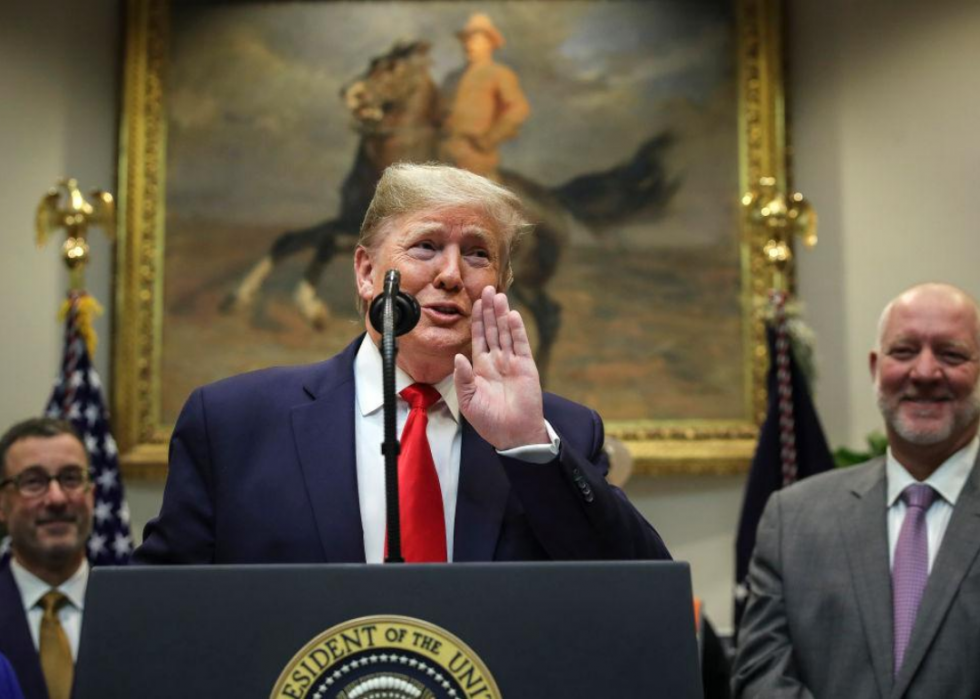
Donald Trump: Climate change
According to The New York Times, President Trump believes that mandates, initiatives, and regulations on climate change would be a threat to jobs, not an opportunity—it was he who removed the United States from the Paris Agreement. He has worked to eliminate or weaken virtually every Obama-era initiative to combat climate change, to deregulate fossil fuel development, and to declaw the EPA. He has gone back and forth between acknowledging climate change and calling it a hoax, and has made wild aspersions about green energy and technology, including the idea that windmills cause cancer.
[Pictured: President Donald Trump speaks during an event to unveil significant changes to the National Environmental Policy Act on Jan. 9, 2020.]
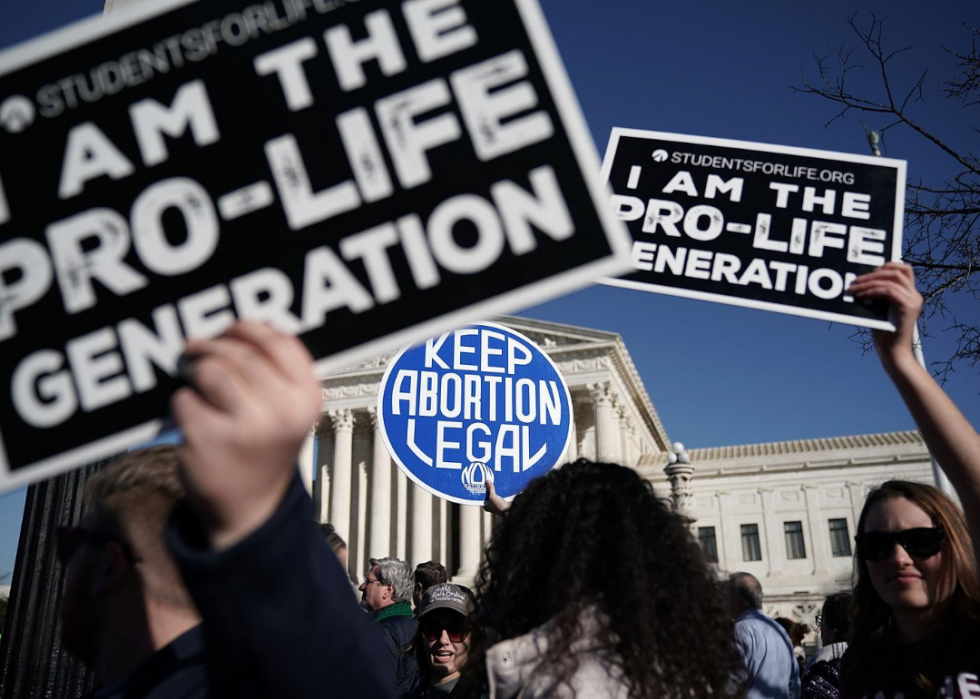
Joe Biden: Abortion and reproductive rights
Over the course of his long career, lifelong Roman Catholic Joe Biden has amassed a muddled and often inconsistent record, both in terms of his words and his votes, when it comes to reproductive rights dating back to the Roe v. Wade decision of 1973. In the modern era, however, Biden has evolved to become staunchly in favor of reproductive rights, most recently bolstering his bona fides by voicing his opposition to the Hyde Amendment, which he long supported. He has been endorsed by NARAL, Planned Parenthood, and most major reproductive rights organizations.
[Pictured: Pro-life activists try to block the sign of a pro-choice activist during the 2018 March for Life, Jan. 19, 2018, in Washington D.C.]
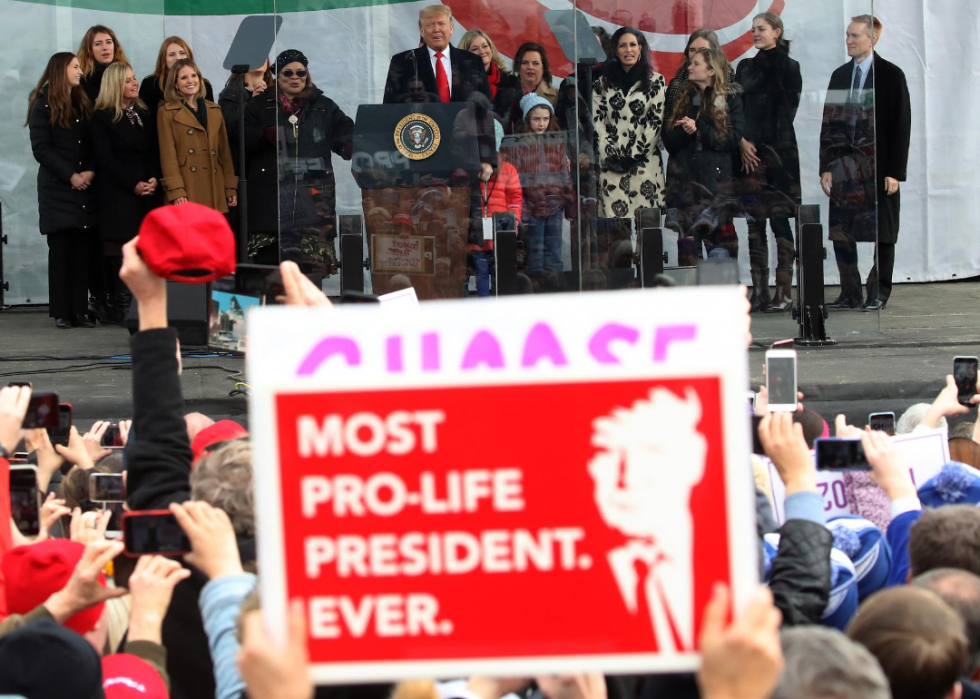
Donald Trump: Abortion and reproductive rights
Donald Trump experienced the opposite evolution as Biden—he was vocally and unrepentantly in favor of abortion rights for years before his political ascent, but has now emerged as what Politico reporter Gabby Orr dubbed the “new GOP standard in the abortion fight.” From saying women should be punished for having abortions to appointing scores of staunchly anti-abortion federal judges, Trump has been a darling of the hardline anti-abortion movement. Many prominent religious conservatives justify their support of Trump—who has lived most of his life counter to their stated core principles—by pointing to his stances and actions on the abortion issue.
[Pictured: President Donald Trump speaks at the 47th March For Life rally on the National Mall, Jan. 24, 2019.]
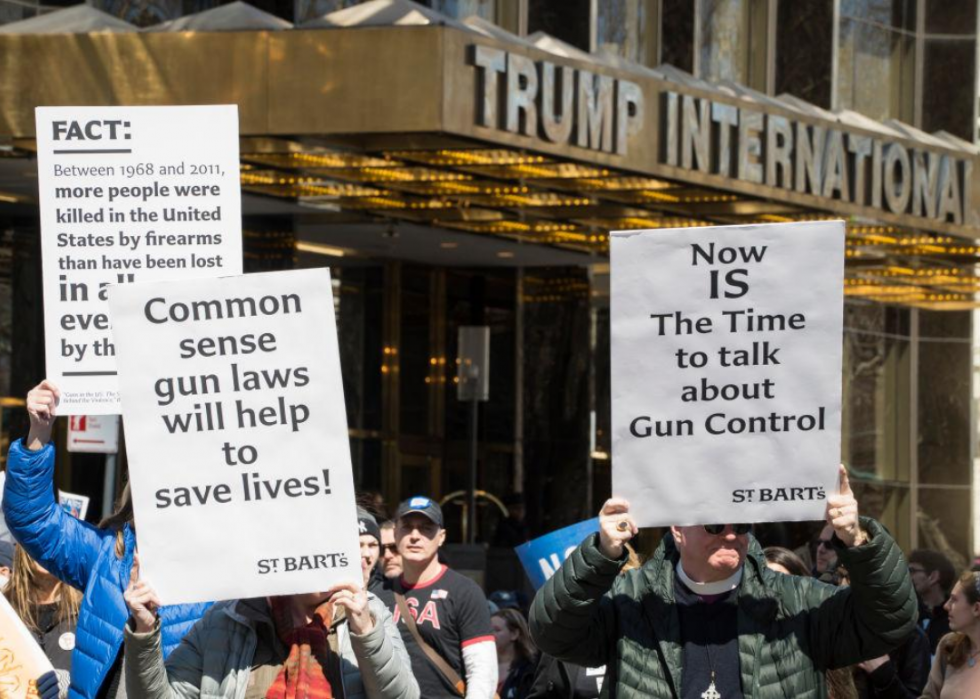
Joe Biden: Gun control
As a primary driver of both the 1993 Brady Handgun Violence Protection Act and the 1994 ban on assault weapons, Biden has a decades-long record on supporting gun control—but he insists he is not anti-Second Amendment. He currently supports banning high-capacity magazines and so-called assault weapons, universal background checks, restrictions on “dangerous” individuals owning guns, adopting universal smart-gun technology, eliminating legal immunity for gun manufacturers, and many more initiatives designed to reduce gun violence.
[Pictured: March For Our Lives rally against gun violence, New York City, March 24, 2018.]

Donald Trump: Gun control
Just as he has among anti-abortion activists, Donald Trump has emerged as an unlikely hero for pro-gun Americans. Trump does not support bans on either high-capacity magazines or so-called assault weapons, and he advocates for national, 50-state concealed-carry rights. His position is that gun bans do not work—he points to large-scale gun violence in big cities with strict gun laws as proof—and instead calls for the full enforcement of laws already on the books.
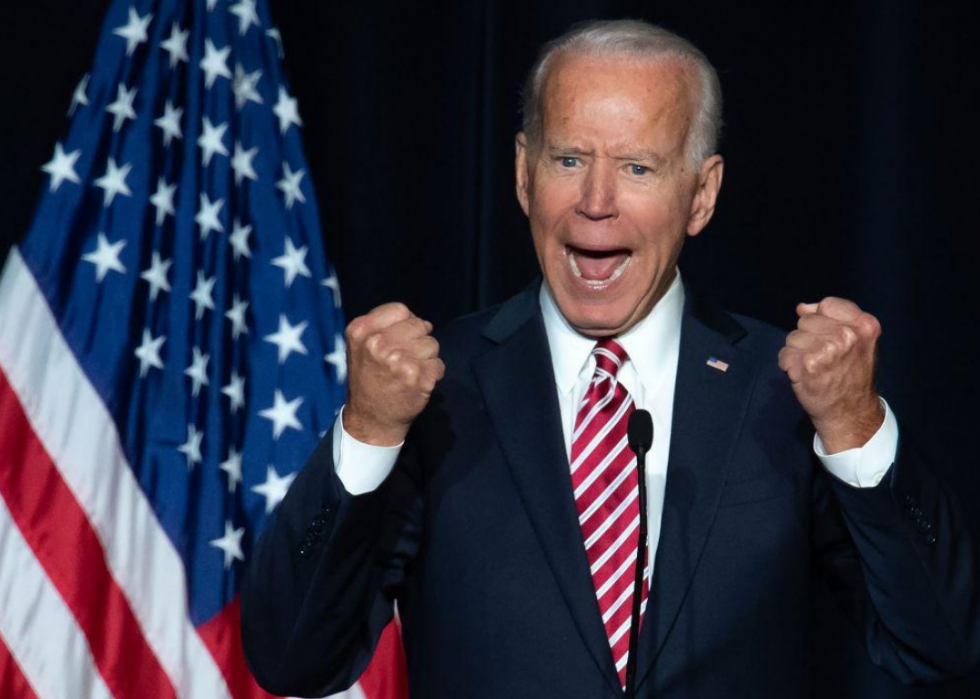
Joe Biden: Criminal justice reform
Biden supports a $20 billion grant program designed to reduce incarceration rates and $300 million for community policing efforts—he also supports the establishment of a federal police oversight commission, national use-of-force standards, the end of mandatory minimum sentencing, and increased use of clemency. Many liberals and longtime advocates, however, are skeptical of Biden's commitment to the cause—and for good reason. Biden authored or vocally supported several major tough-on-crime bills in the '80s and '90s that packed America's prisons—mostly with poor people and minorities—and militarized America's police departments.
[Pictured: Joe Biden speaks during the First State Democratic Dinner in Dover, Delaware, on March 16, 2019.]
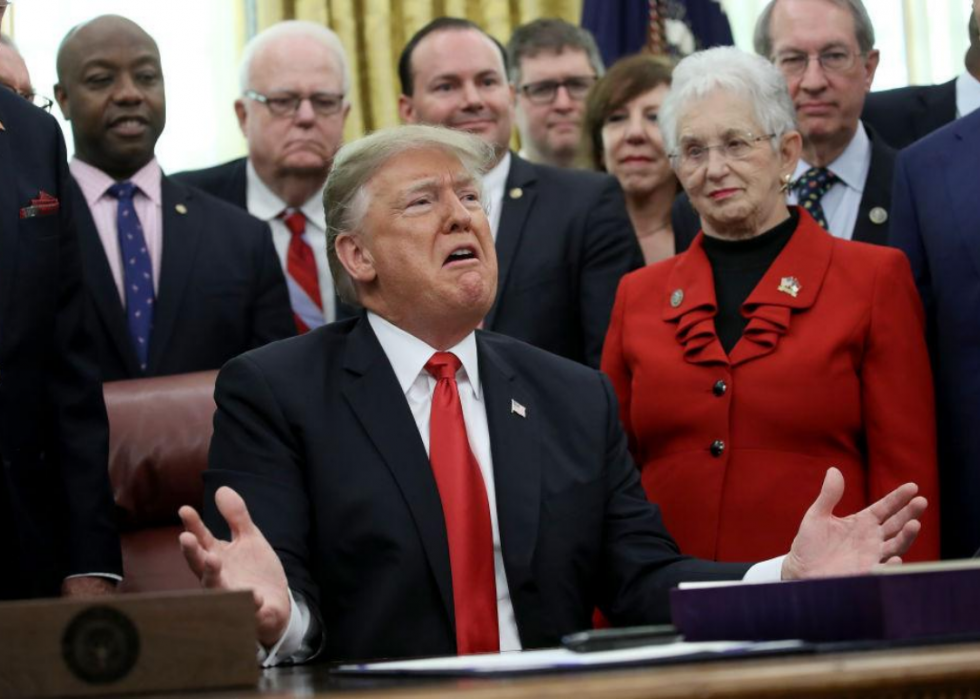
Donald Trump: Criminal justice reform
Trump, too, is a mixed bag on criminal justice reform. In 2018, he signed the First Step Act, which was the first major criminal justice reform law in a generation and one that significantly reduced the federal prison population, sent thousands of reformed prisoners home early, and reduced unfair crack cocaine-related sentences handed down in the past mostly to Black offenders. He also, however, called for expanding stop-and-frisk policing, aided the expansion of private prisons, and reinstated the federal death penalty.
[Pictured: President Trump signs Criminal Justice Reform Bill into law on Dec. 21, 2018.]
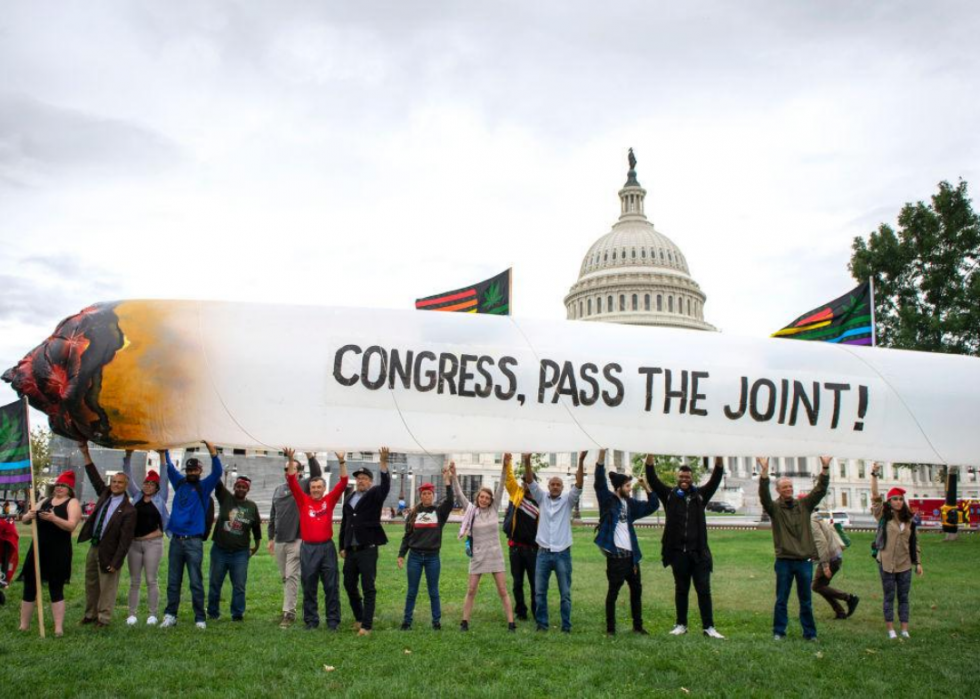
Joe Biden: Marijuana legalization
Another reason liberals are skeptical of Biden on criminal justice reform is for his stance on marijuana, which is still classified federally alongside heroin as a Schedule 1 narcotic—and just like all drugs, minorities are far more likely to be prosecuted and incarcerated for possessing or selling it than white people. Biden advocates for decriminalization, which is farther than any other president has been willing to go, but it is not the same thing as legalization, which most Americans now support. Biden recently outraged advocates when he cited the long-debunked “gateway drug” theory when it seems that pot should be an easy issue for a Democrat—nearly four out of five people in Biden’s party support full legalization.
[Pictured: Marijuana activists hold up a 51-foot inflatable joint during a rally at the U.S. Capitol.]
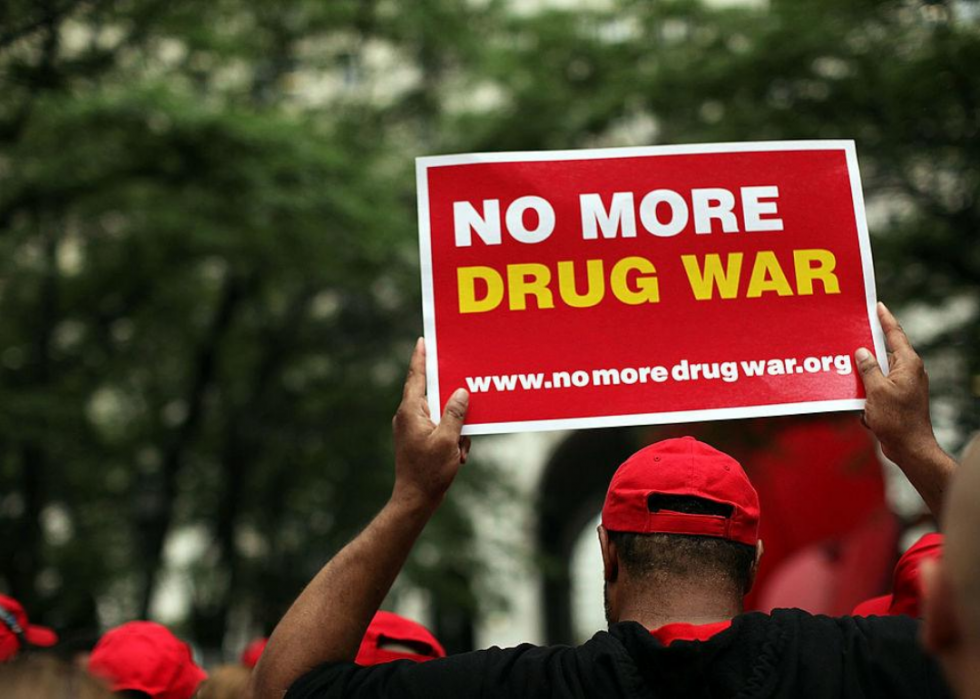
Donald Trump: Marijuana legalization
One of the few things both Trump and Biden agree on is marijuana legalization—Trump, too, believes it should remain a controlled substance, although he hasn’t taken the step of enforcing federal pot laws in states that have legalized it. Although Democrats are much more likely to call for full legalization, two out of three Americans in general now support legal recreational use, including a comfortable majority of independents and even a slim majority of Republicans.
[Pictured: Marijuana legalization advocates attend a rally against marijuana arrests in New York City.]
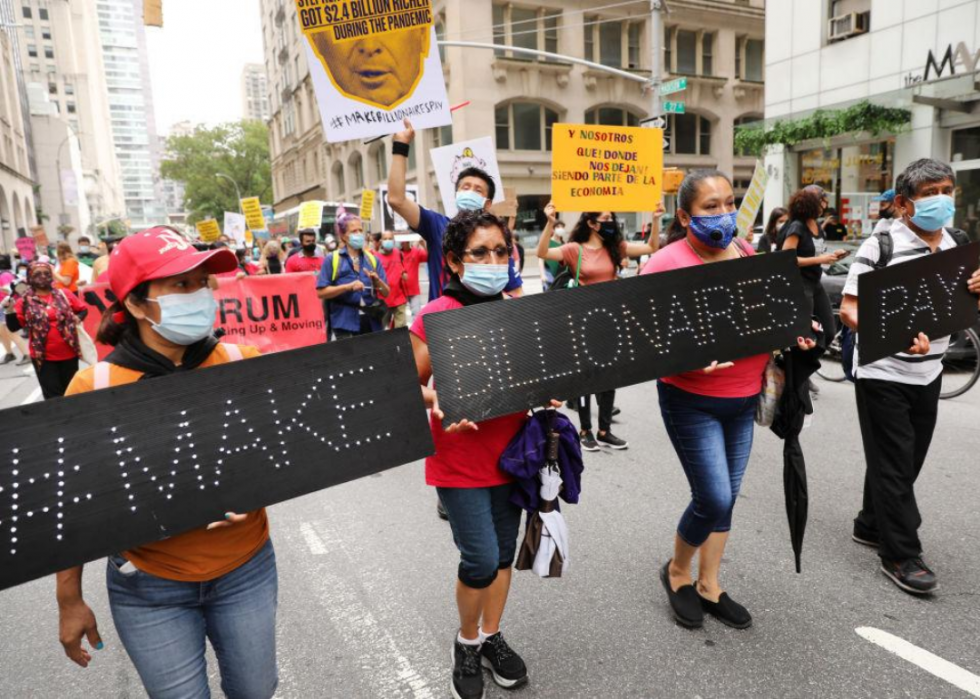
Joe Biden: Taxes
Joe Biden has pledged to reverse parts of Trump’s signature tax legislation, most notably by raising the rate for top earners from 37% back to 39.6%. He has also said he wants to raise the capital gains tax from 20% to 39.6% for people making over $1 million a year and repeal a provision that allows people to sell inherited assets while paying no taxes or very little taxes.
[Pictured: People participate in a March on Billionaires event on July 17, 2020, in New York City.]
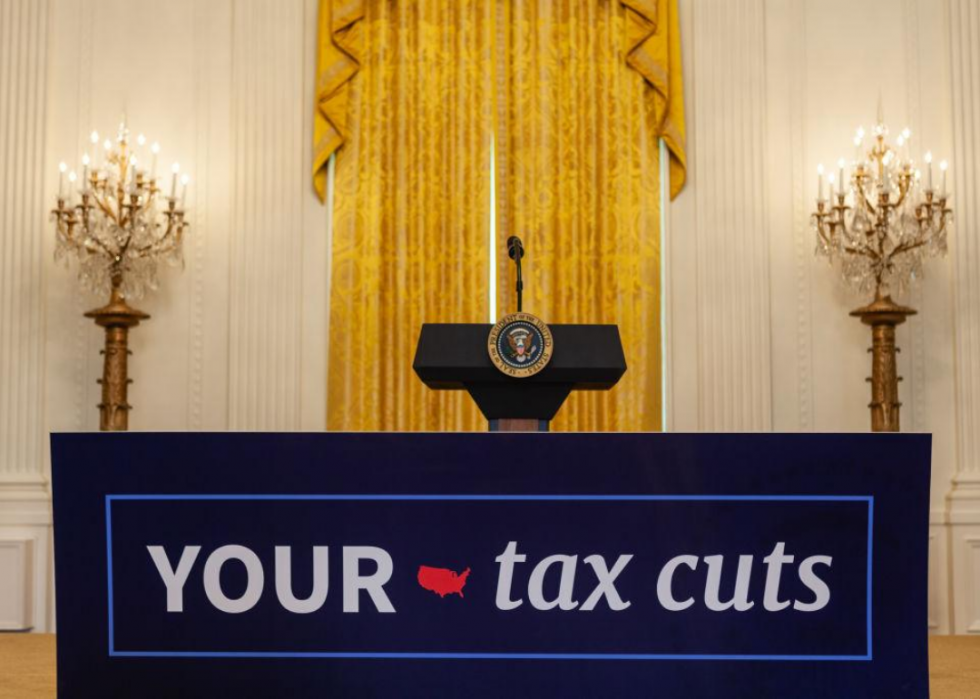
Donald Trump: Taxes
In 2017, President Trump signed the signature achievement of his first term: the Tax Cuts and Jobs Act, which was the biggest overhaul of the federal tax code in 30 years. It created a single corporate tax rate of 21% and, although it contained provisions that resulted in many individuals and families paying lower taxes, many of those provisions expire in 2025 and the lion's share of the benefits went to permanent cuts for corporations and the wealthy. Trump has touted the law as the driving force behind the strong pre-coronavirus economy and vowed to block any attempt to raise taxes as the new economy recovers.
[Pictured: An event celebrating the Republican tax cut plan in the East Room of the White House in Washington D.C., on June 29, 2018.]
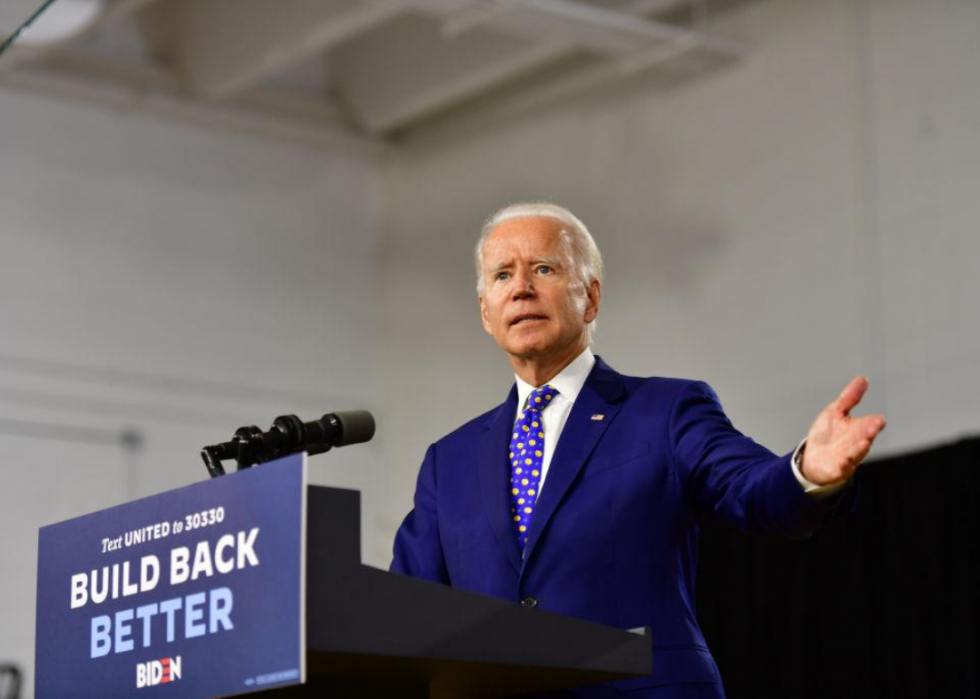
Joe Biden: Poverty and income inequality
Many of Joe Biden’s proposals regarding poverty and income inequality are tied to his “Build Back Better” proposals on race and social justice—but they also deal with rebuilding the middle class in general. They include encouraging homeownership, strengthening unions, checking corporate power, raising the minimum wage to $15, and creating a Cabinet-level position dedicated to labor and workers’ rights. He also outlined a plan to combat poverty in rural America, support farmers, and revitalize rural economies.
[Pictured: Joe Biden delivers a speech in Wilmington, Delaware, on July 28, 2020.]
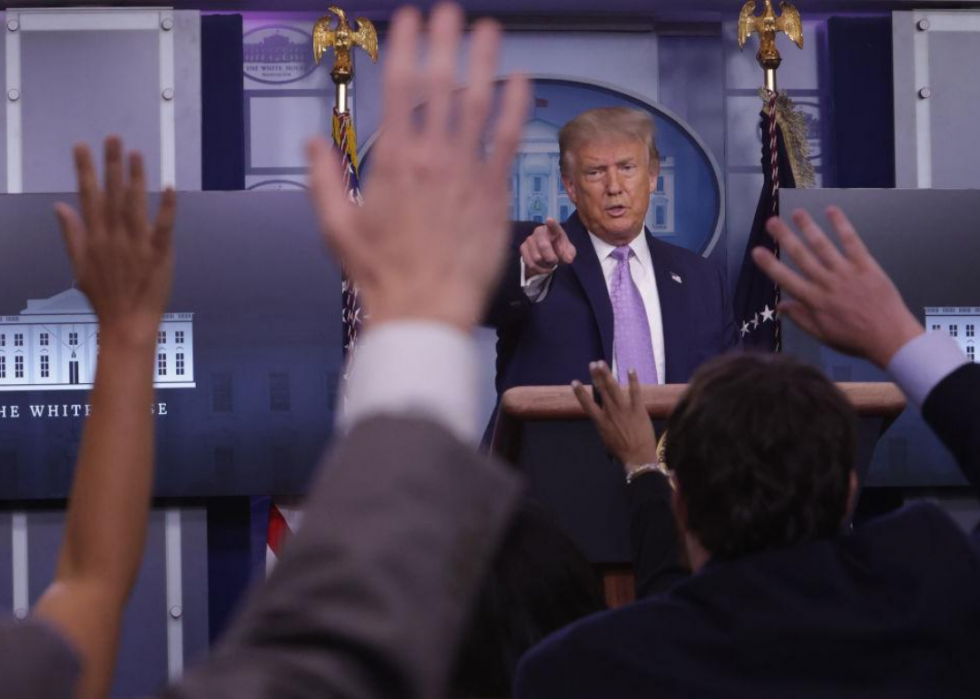
Donald Trump: Poverty and income inequality
Like Trump himself, the official White House website claims that he reversed failed policies and rebuilt a failed economy into a pre-coronavirus juggernaut while touting a steady decline in poverty and minority unemployment during his time in office. The truth is that Trump inherited a strong economy from Barack Obama, who rebuilt it from the rubble of the Great Recession—but it is fair for Trump to take credit for overseeing a time of low unemployment and declining poverty. What the site doesn’t mention is that Trump sought to lower the poverty threshold, essentially making it harder for all but the most destitute Americans to qualify as being poor. Also, the employment rate is a separate issue from income inequality, which has risen steadily and dramatically over the past half-century regardless of which party was in power and is now starker than it is in any other G7 country—the top 0.1% now earns 196% times as much as the bottom 90% of America.
[Pictured: President Donald Trump speaks during a news conference in White House on Aug. 5, 2020.]
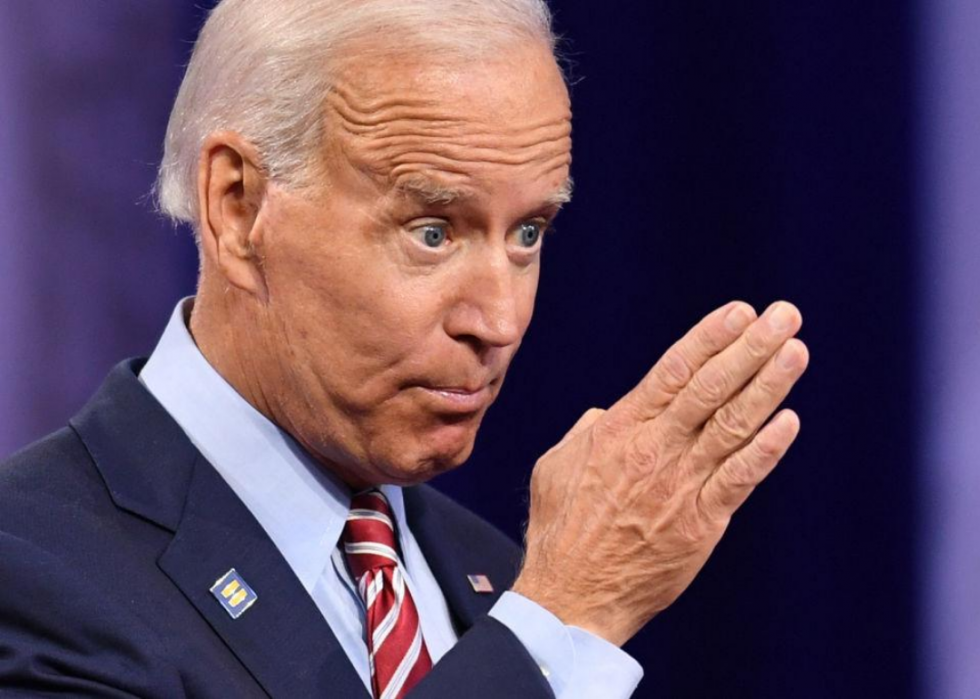
Joe Biden: Big tech and social media
Joe Biden has both a mixed message and a mixed record on big tech and the mountains of data the industry’s companies collect, the massive fortunes and political clout they wield, and the power they hold over the communication of ideas. Big tech largely enjoyed a cozy relationship with the Obama administration, but Biden has since criticized the political content and foreign influence on social media. He proposed a minimum tax on giants like Amazon, called for increased regulations, and indicated that he’s open to discussing breaking up companies like Facebook.
[Pictured: Joe Biden gestures as he speaks during a town hall in Los Angeles on Oct. 10, 2019.]
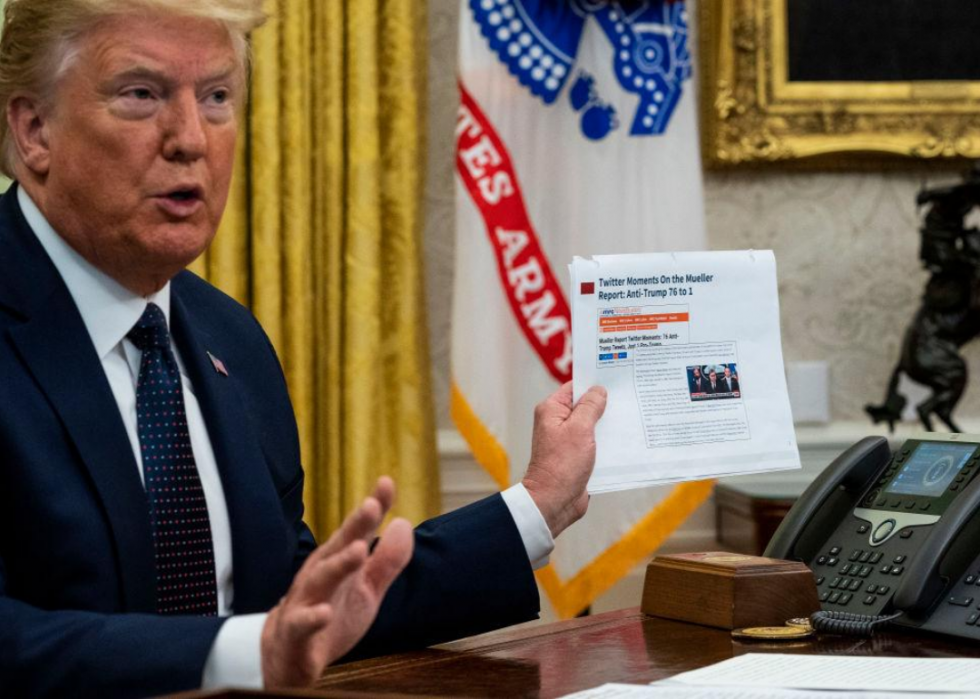
Donald Trump: Big tech and social media
President Trump has been a frequent and vocal critic of big tech, although much of that involves personality clashes like those he has with Amazon’s Jeff Bezos, who owns the Washington Post, a favorite whipping boy of the president. He also accuses social media in general of censorship against conservatives, although he’s never presented any evidence, and attacked Apple for refusing to unlock phones of suspected criminals at the behest of law enforcement. In terms of policy, the president has launched a sprawling antitrust investigation against big tech companies, but like Biden, he has stopped short of calling for breaking them up outright.
[Pictured: President Donald Trump speaks in the Oval Office before signing an executive order related to regulating social media.]
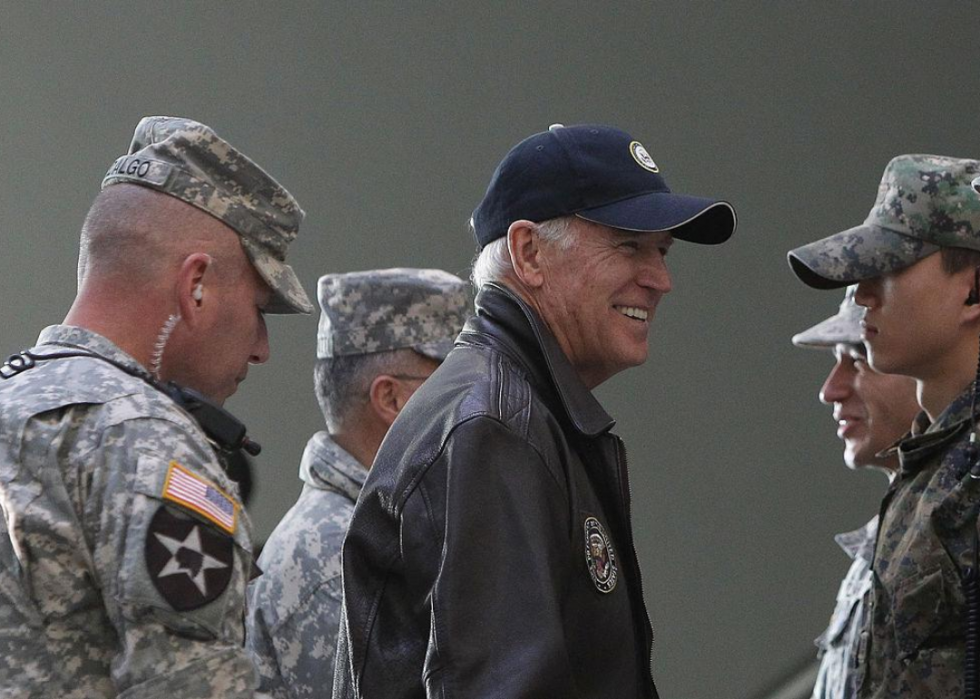
Joe Biden: The military
Like all politicians who value their jobs or prospects for election, Joe Biden emphatically states his support for the fewer than 1% of the American population that volunteers to serve in the U.S. Armed Forces. He touted his involvement in Obama-era initiatives like Joining Forces and the Military Spouse Employment Partnership. Should he be elected, the proposals for his administration include paying servicemen and women higher wages; providing greater support for their spouses, survivors, and caregivers; and providing greater support for their housing and child care needs.
[Pictured: Joe Biden talks with soldiers during a visit on Dec. 7, 2013, South Korea.]
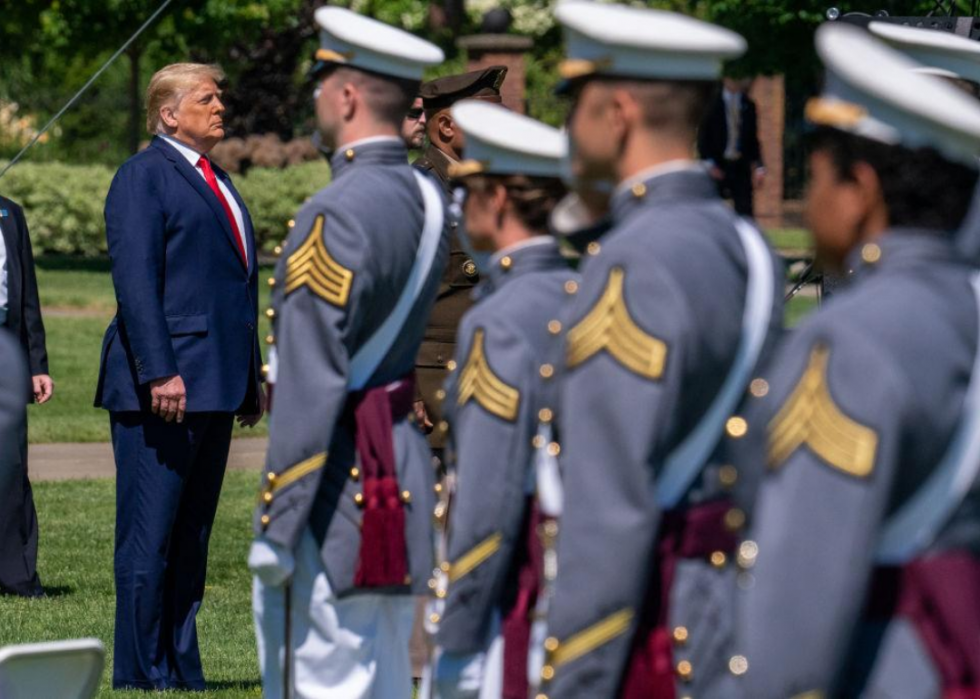
Donald Trump: The military
President Trump has said publicly that he’s the most pro-military president in history, and he can take credit for securing an enormous Armed Forces spending bill, as well as for the fact that a majority of service members and veterans voted for him and that many continue to support him today. Unlike any president in modern history, however, he publicly and casually disparaged a Gold Star family; mocked war hero John McCain for being captured in Vietnam; belittled and insulted high-ranking, well-regarded generals with whom he disagreed; pardoned a convicted war criminal against the objections of the military; and dismissed brain trauma as not counting as a war injury.
[Pictured: President Donald Trump reviews the cadets at the end of the commencement ceremony on June 13, 2020.]
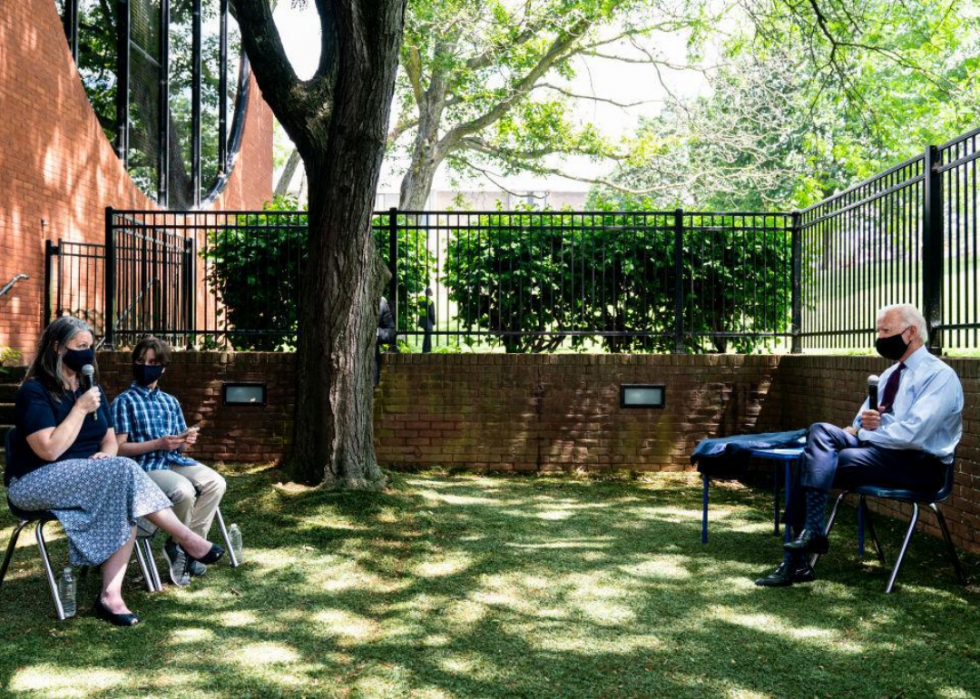
Joe Biden: Health care
The Affordable Care Act (ACA) was the hallmark achievement of the Obama-Biden administration, and Biden has vowed to defend, strengthen, and expand the ACA should he be elected. He also has announced plans to offer a public option that his campaign describes as being similar to Medicare, as well as expanded coverage for low-income Americans and tax credits for middle-class families.
[Pictured: Presidential candidate Joe Biden speaks in Lancaster, Pennsylvania, on health care.]
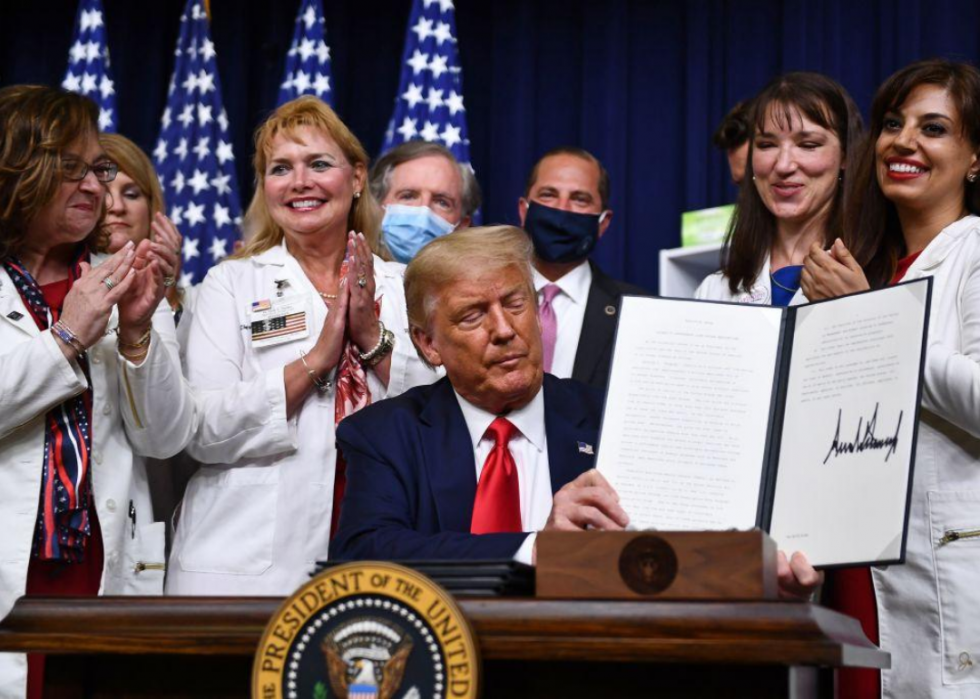
Donald Trump: Health care
Donald Trump ran on repealing the ACA immediately after being sworn in as his most pressing priority and replacing it with something much better. He kept true to his word in that he—and his allies in the Republican Party—consistently undermined and attacked Obamacare, but the ACA remains law despite the fact that the GOP controlled all three chambers of power for two years. Trump has promised that he was about to unveil a new and better plan at least 15 times during his presidency, but as of Aug. 7, he has yet to present an alternative to the ACA.
[Pictured: Donald Trump signs an executive order on lowering drug prices at the White House on July 24, 2020.]
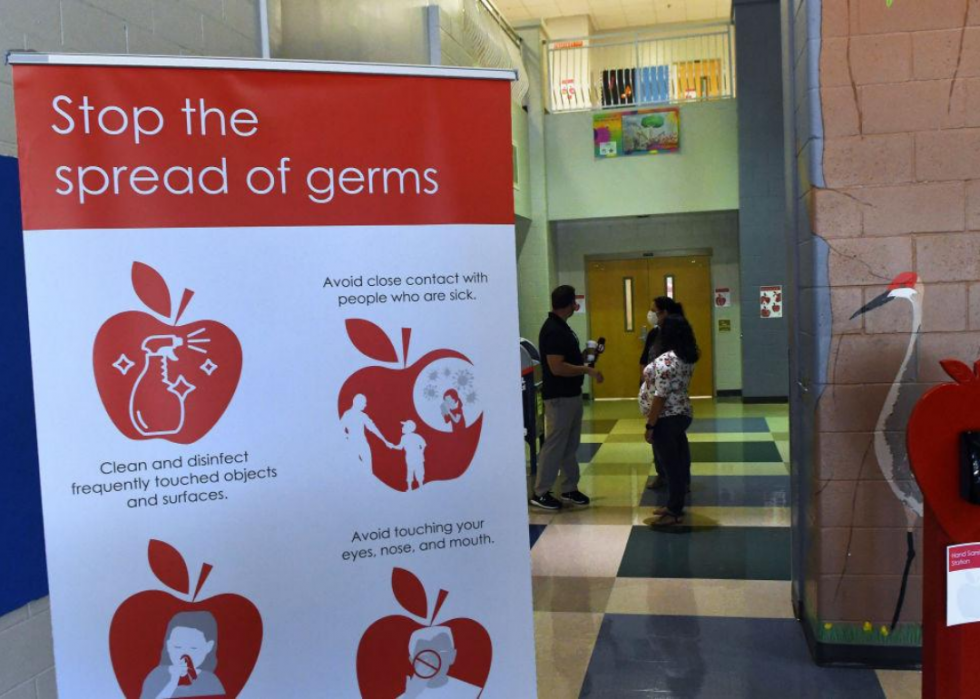
Joe Biden: School reopenings
Joe Biden unveiled a five-point plan for reopening America’s schools as the COVID-19 crisis rages on. It calls for getting the virus under control, setting national safety guidelines, allocating money for schools, child care providers, and educational technology, ensuring quality learning, and closing the racial and income gap in education that became evident during the coronavirus shutdown.
[Pictured: Heath safety precautions are seen posted in the lobby at Layer Elementary School in Winter Springs, Florida.]
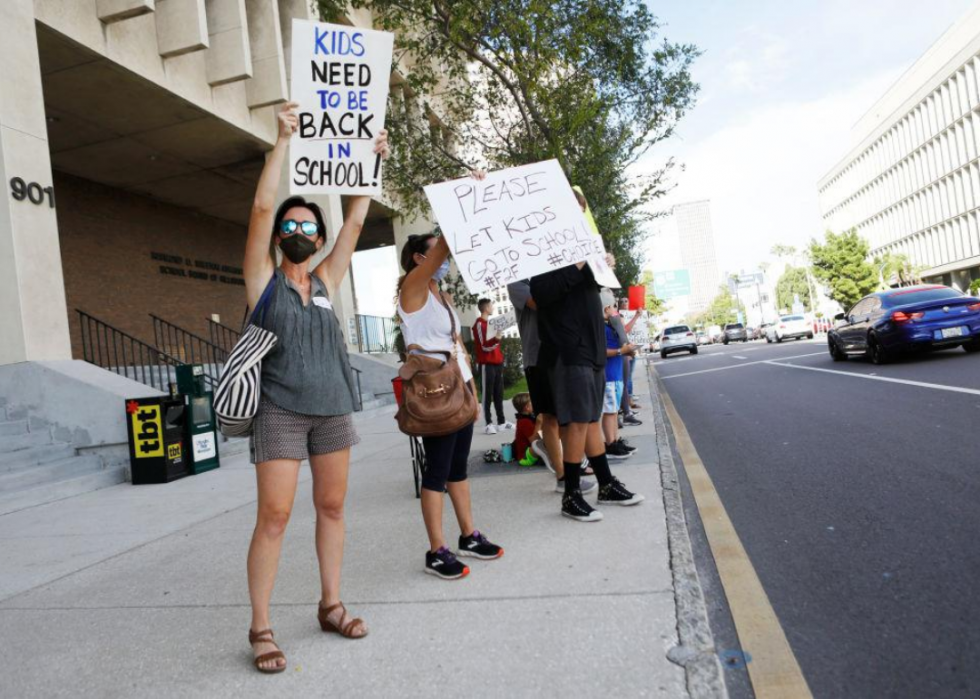
Donald Trump: School reopenings
President Trump has said publicly and repeatedly that virtually all schools should open on time with virtually no exceptions across the United States for in-person learning. In early July, he dismissed the Centers for Disease Control and Prevention's guidelines for reopening as unduly burdensome and expensive and ordered new recommendations to be made. The president then threatened to cut funding to schools that don't reopen for in-person classes.
[Pictured: A supporter calling for Hillsborough County Florida schools to reopen.]
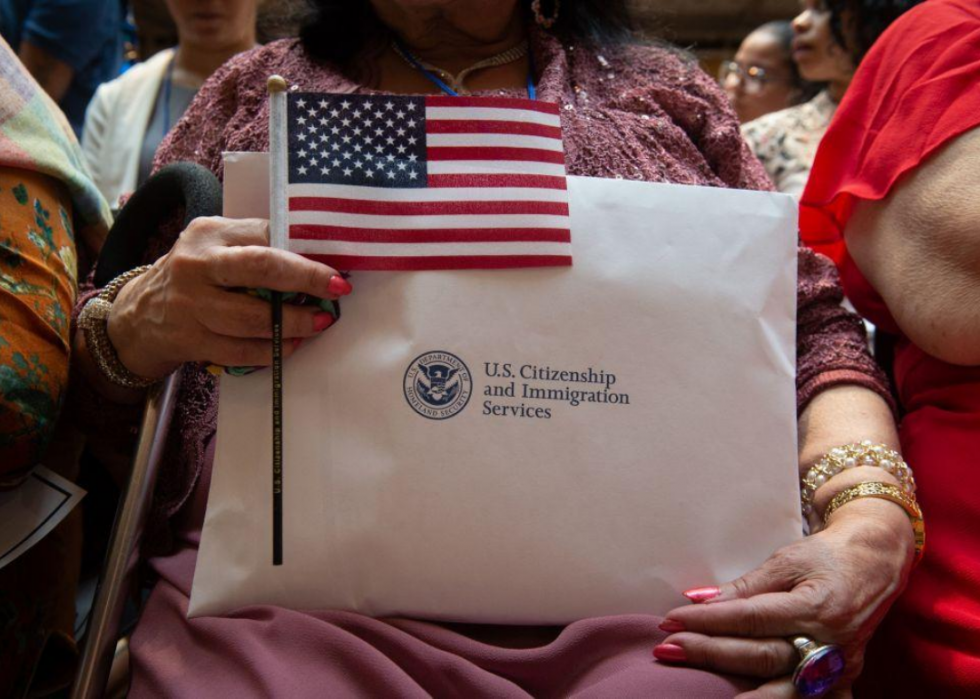
Joe Biden: Immigration
Biden’s official policy position takes a pro-immigrant stance and begins with overturning most of President Trump’s hardline initiatives on immigration, many of which have been derided by activists as racist and deliberately cruel. He also vows to return the United States to its status as a haven for refugees and asylum-seekers. Part of his plan deals with modernizing border screening and the larger immigration system and reforming Immigration and Customs Enforcement (ICE), the federal law enforcement agency that serves as the tip of the spear for immigration enforcement.
[Pictured: U.S. Citizenship and Immigration Services welcomes 200 new citizens from 50 countries during a ceremony in honor of Independence Day 2018.]
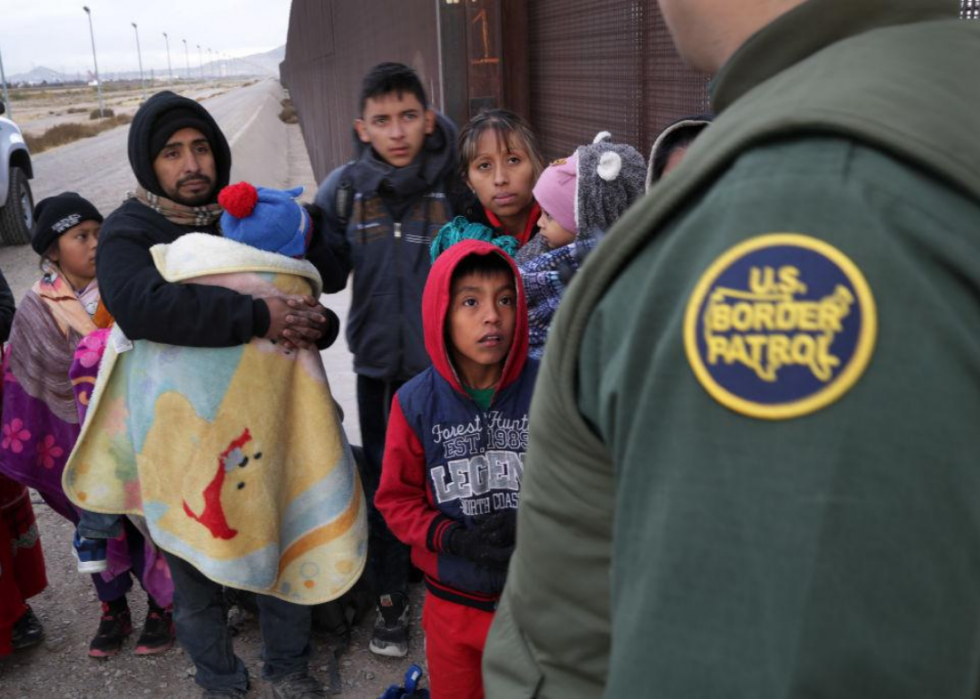
Donald Trump: Immigration
Donald Trump promised a severe and hard-line immigration policy throughout his campaign—he launched his bid for office by stereotyping immigrants from Latin America as rapists and murderers—and to the delight of his base and the horror of human rights activists, he delivered. Although his long-promised wall is still mostly unbuilt, Trump quickly imposed restrictions on refugees and asylum-seekers, banned people from Muslim countries, targeted pregnant women specifically, slowed applications for green cards and citizenship, expedited deportations, ordered ICE to conduct mass roundups, and used language that stoked resentment and anger toward immigrants. His most controversial policy by far, however, was separating family members—including parents and the youngest of children—many of whom were detained apart for months and will have no way of locating each other after deportation.
[Pictured: A U.S. Border Patrol agent speaks with Central American immigrants at the U.S.-Mexico border.]
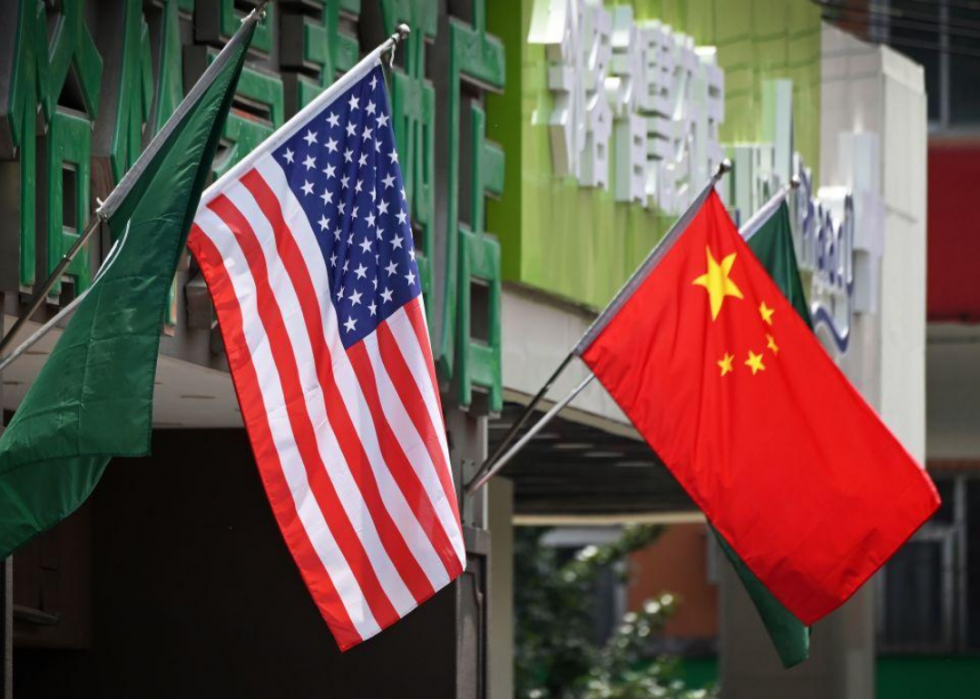
Joe Biden: Tariffs on China
Biden recently said he would remove Trump’s tariffs on products from China, according to Forbes, although one of his staffers later walked that back and clarified that Biden would only reevaluate the punitive taxes paid on certain imports. He would only remove the tariffs, the former vice president said, in exchange for changes in China’s behavior on the international stage, including the country’s alleged attempts at stealing intellectual property from the United States and others. Biden pointed out that Trump’s trade war with China cost the United States billions of dollars in the agricultural sector alone when U.S. taxpayers were forced to pay for huge bailouts to struggling farmers.
[Pictured: Flags are displayed outside a hotel in Beijing on May 14, 2019.]
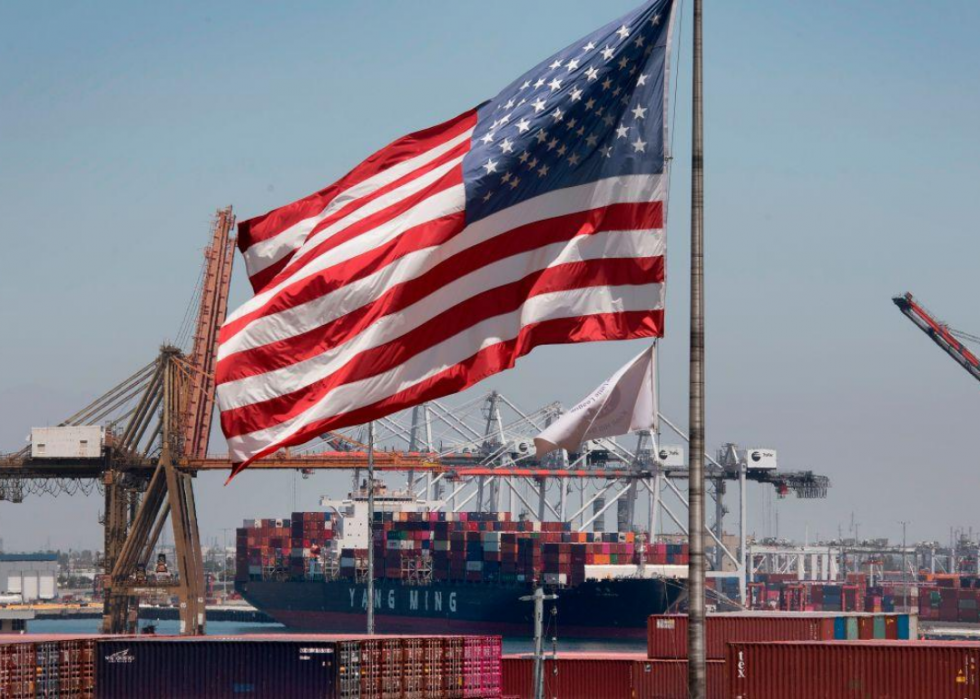
Donald Trump: Tariffs on China
Donald Trump campaigned on punishing what he called China’s unfair trade practices and shortly after taking office, he delivered on that promise with punitive tariffs on some imports, like Chinese steel. China quickly responded with retaliatory tariffs on American agricultural products and other U.S. exports. The American taxpayer is footing the bill for Trump’s trade war, according to the conservative American Action Forum, to the tune of $57 billion a year in increased consumer costs and tens of billions of dollars more in bailouts to the agricultural industry and others.
[Pictured: The United States flag flies over a container ship unloading it's cargo from Asia.]
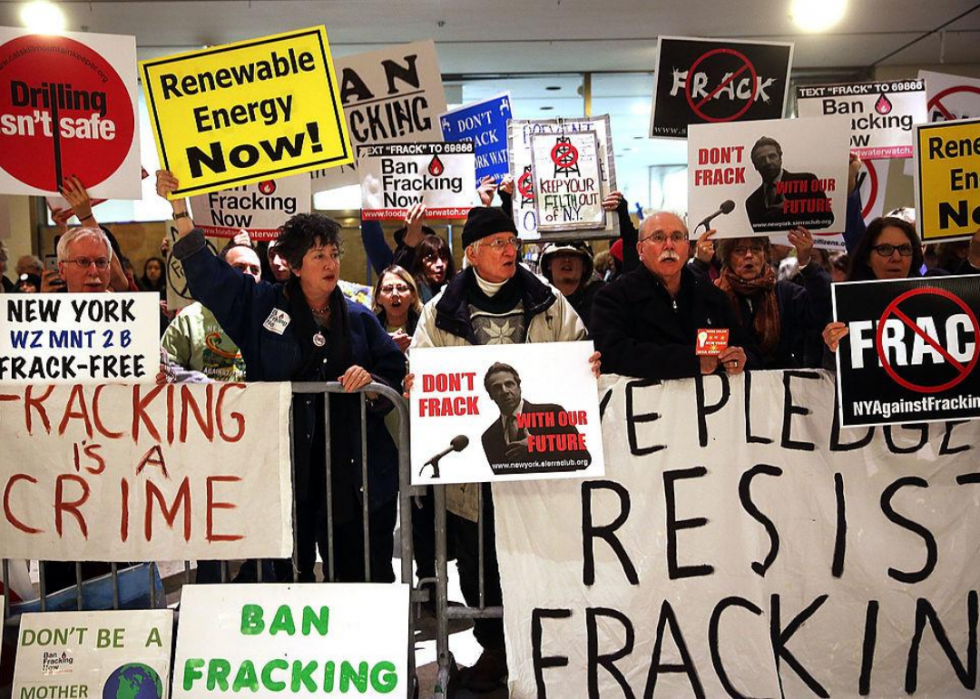
Joe Biden: Fracking and coal
Despite a Trump-aligned ad campaign declaring Biden's intention to immediately eliminate fracking and coal, Biden has said only that he wants the United States to replace fossil fuels with clean energy by 2050, according to FactCheck.org. Biden has tried to perform a balancing act on the issue, espousing his disdain for dirty fossil fuels to environmentalists while acknowledging that the industry provides jobs across America and that fracking has helped the U.S. become a top global energy provider.
[Pictured: Anti-fracking protesters gather in Albany, New York, on Jan. 8, 2014.]
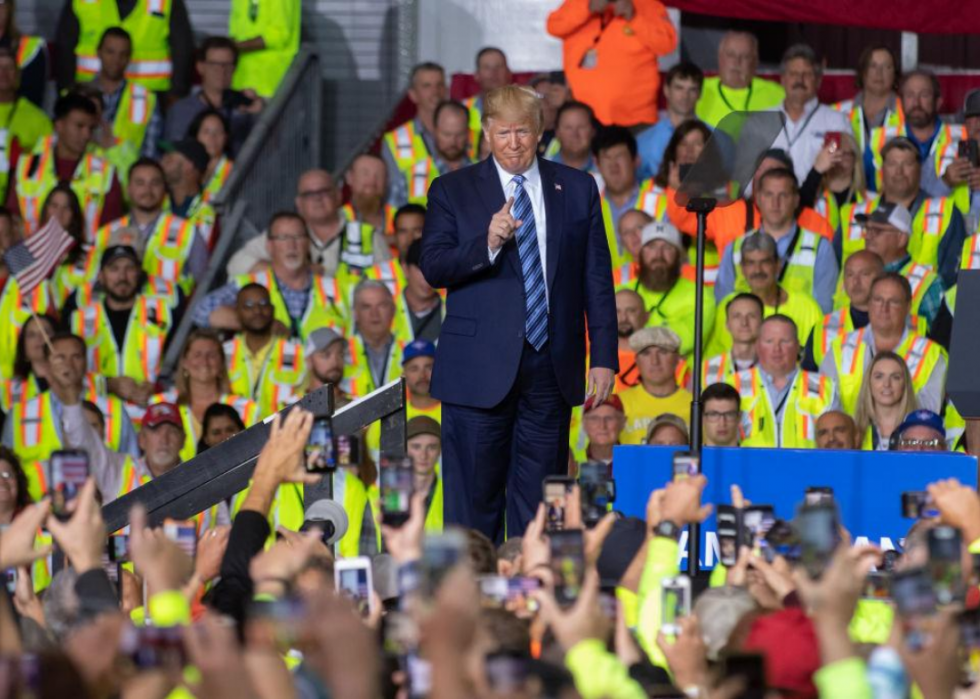
Donald Trump: Fracking and coal
During his campaign, Trump positioned himself as staunchly pro-energy, specifically promising to revive the dying coal industry. That promise he couldn’t keep, as coal continues its decades-long decline, but he did remove a slew of environmental regulations sought by coal bosses and lobbyists. The fracking industry, however, did enjoy a boom as Trump removed regulations in that industry as well, and opened millions of acres of public lands to energy exploration and development.
[Pictured: Donald Trump speaks to contractors at the Shell Chemicals Petrochemical Complex on Aug. 13, 2019, in Monaca, Pennsylvania.]
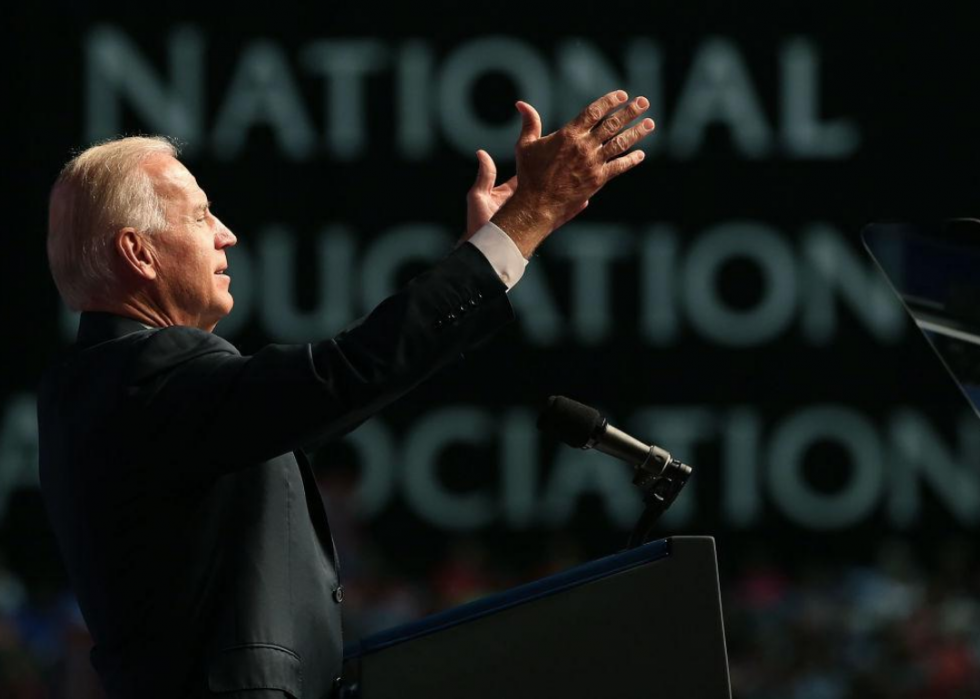
Joe Biden: School choice
President Trump has attempted to paint Joe Biden as being against school choice and in favor of abolishing charter schools. According to FactCheck.org, that’s not true—Biden opposes only federal funding for a small number of for-profit charter schools and vouchers for private school tuition. The former vice president does, however, support parents and students being given the choice between different public schools, successful charter schools, and magnet schools.
[Pictured: Vice President Joseph Biden speaks at the National Education Association convention on July 3, 2012.]
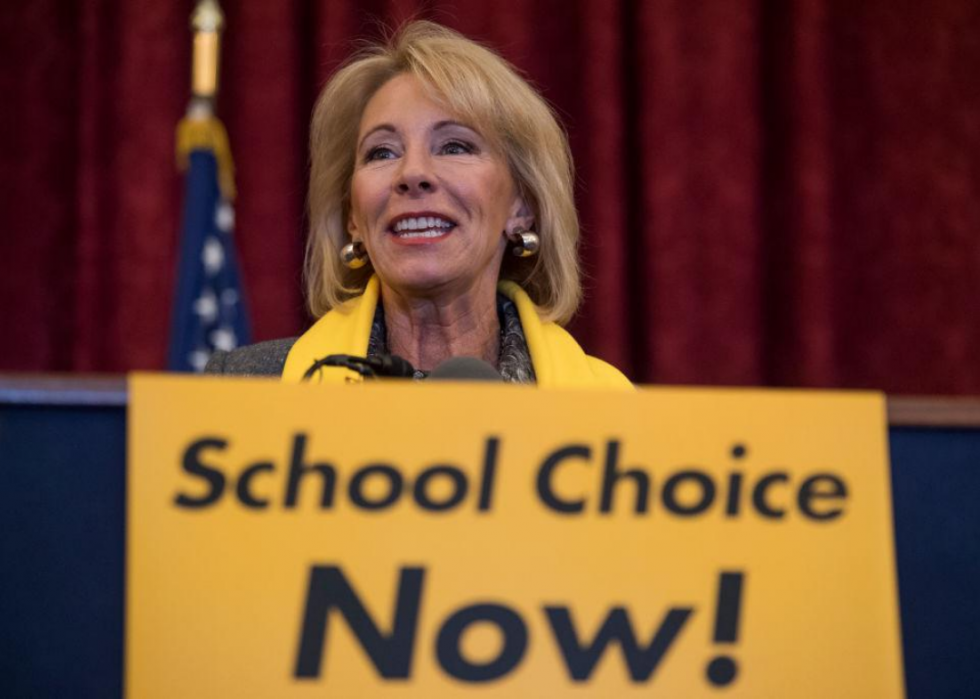
Donald Trump: School choice
President Trump said recently that “school choice is the civil rights statement of the year,” according to Forbes. Trump and Education Secretary Betsy DeVos are strong proponents of charter schools and vouchers for private schools—they recently required public schools to use emergency CARES Act funds on private schools in their districts.
[Pictured: Education Secretary Betsy DeVos during a rally to promote school choice on Jan. 18, 2018.]
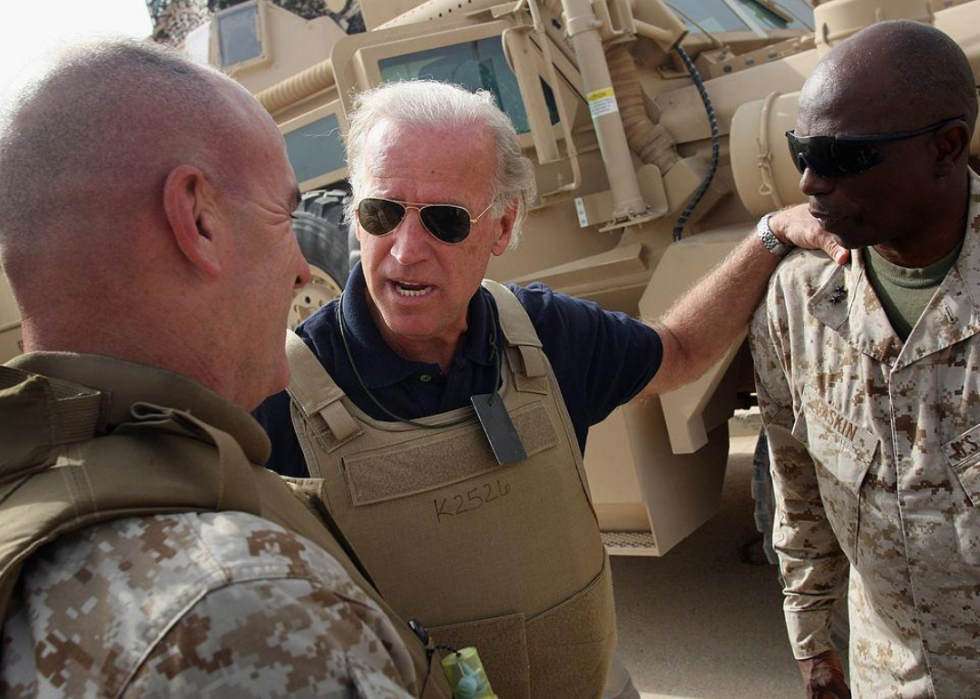
Joe Biden: Presence in the Middle East
Joe Biden is running, in part, on his long experience with affairs in the Middle East. He spent decades crafting America’s Middle East policy and diplomatic efforts and is a known entity in the region. Many in his party, however, keep it fresh in their minds that he voted for the war in Iraq.
[Pictured: Sen. Joseph Biden speaks U.S. Marine generals during a visit to Ramadi, Iraq, Sept. 6, 2007.]
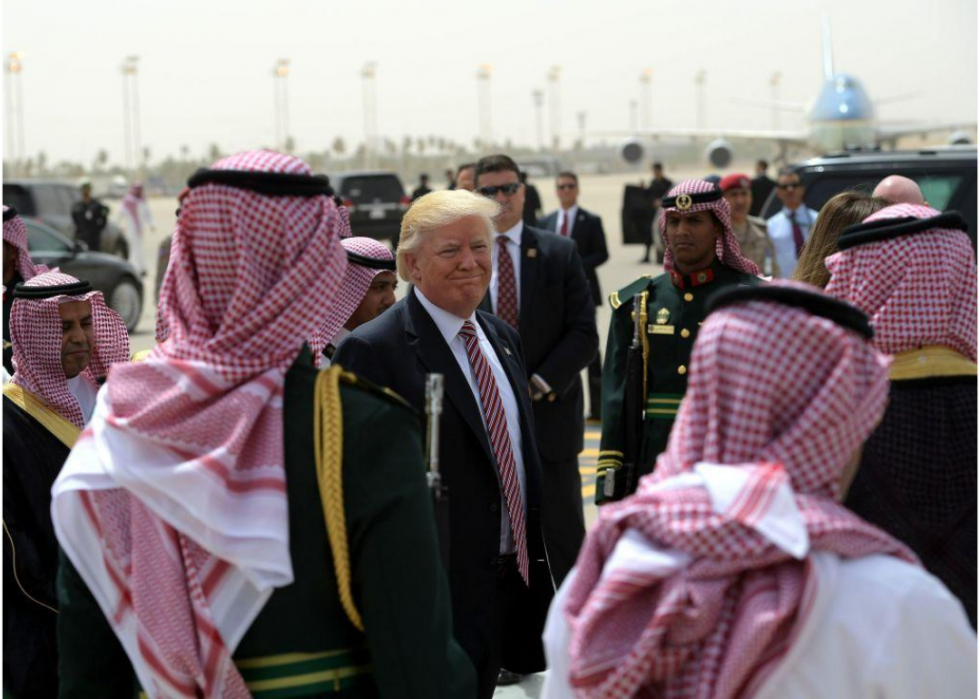
Donald Trump: Presence in the Middle East
President Trump has been a staunch supporter of Israel, as well as Saudi Arabia and Egypt. He's escalated tensions with an aggressive posture toward Iran—in a controversial move that could have been seen as an act of war, he ordered the assassination of a high-ranking Iranian intelligence officer. As an overarching philosophy, Trump has been skeptical of America's "endless wars" in the region and has questioned the benefits of the United State's continued presence in the Middle East.
[Pictured: Donald Trump makes his way to board Air Force One in Riyadh on May 22, 2017.]

Joe Biden: Israeli-Palestinian relations
Many Palestinians hope that a Biden presidency would foster a more balanced U.S. policy as it relates to Israel and the Palestinian territories, according to Reuters. He has come out against Prime Minister Benjamin Netanyahu’s plans to claim sovereignty over Jewish settlements of West Bank territory Israel seized in the 1967 war, and he has opposed any unilateral action by either side that would threaten a future peace deal.
[Pictured: Palestinian women take part in a protest against Israel's plan to annex parts of the Israeli-occupied West Bank.]
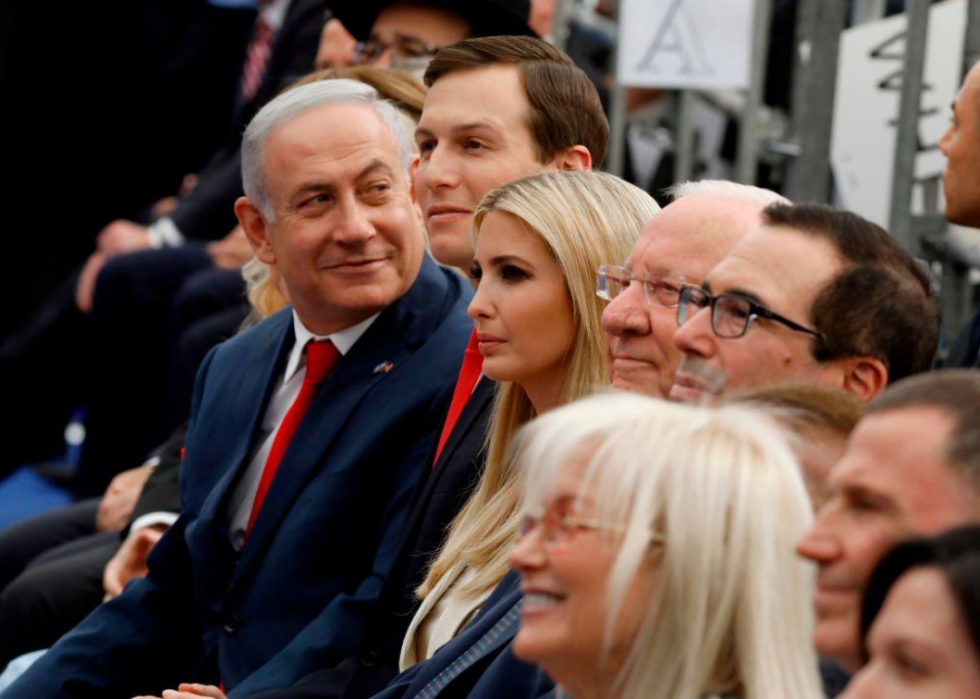
Donald Trump: Israeli-Palestinian relations
Donald Trump has been an unequivocal supporter of Israel. He cut aid to the Palestinian Authority, moved the U.S. Embassy from Tel Aviv to Jerusalem, and supported Israel’s annexation of parts of the West Bank that the Palestinians envision as part of their future state.
[Pictured: The opening of the U.S. embassy in Jerusalem on May 14, 2018.]
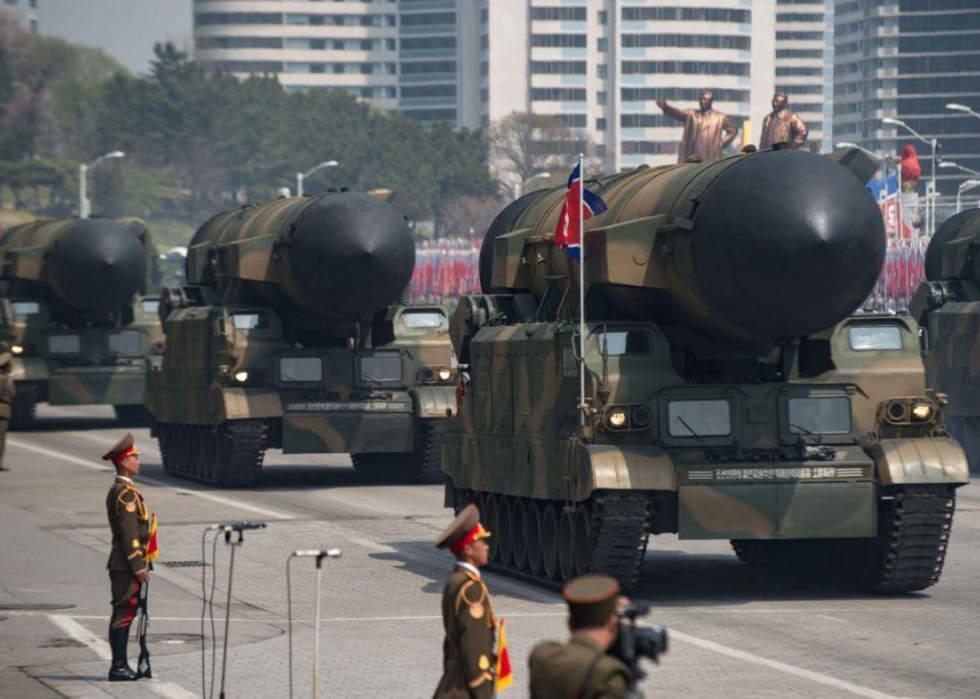
Joe Biden: North Korea
Biden has attacked President Trump’s unprecedented openness to North Korean relations as diplomacy without a mission and has argued that Trump has “rushed to legitimize a dictator,” according to Politico. Biden has said he’s open to diplomacy with the isolated, nuclear-armed nation, but not without major concessions.
[Pictured: Military parade marking the 105th anniversary of the birth of late North Korean leader Kim Il-Sung in Pyongyang.]
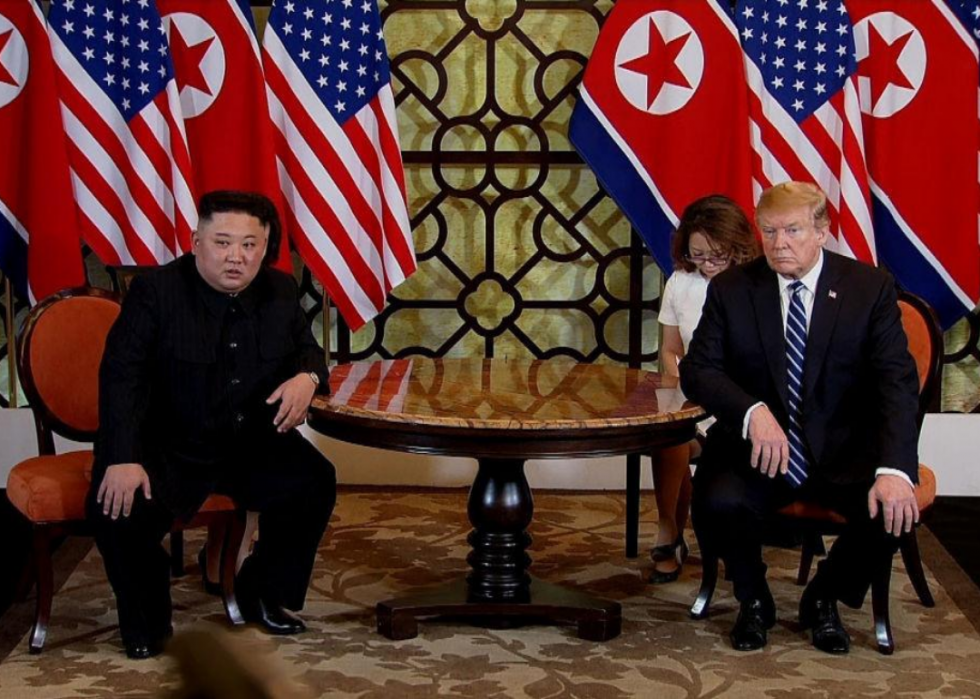
Donald Trump: North Korea
President Trump has met with Kim Jong Un an unprecedented three times and even became the first sitting American president to physically enter the rogue nation’s territory. Although his critics detract his relationship with the country’s leader as giving legitimacy to a dictator who flouts international law, Trump has insisted it’s necessary and worth it to convince North Korea to abandon its nuclear program. So far, that hasn’t happened.
[Pictured: President Donald Trump and North Korean leader Kim Jong Un during their second summit meeting.]
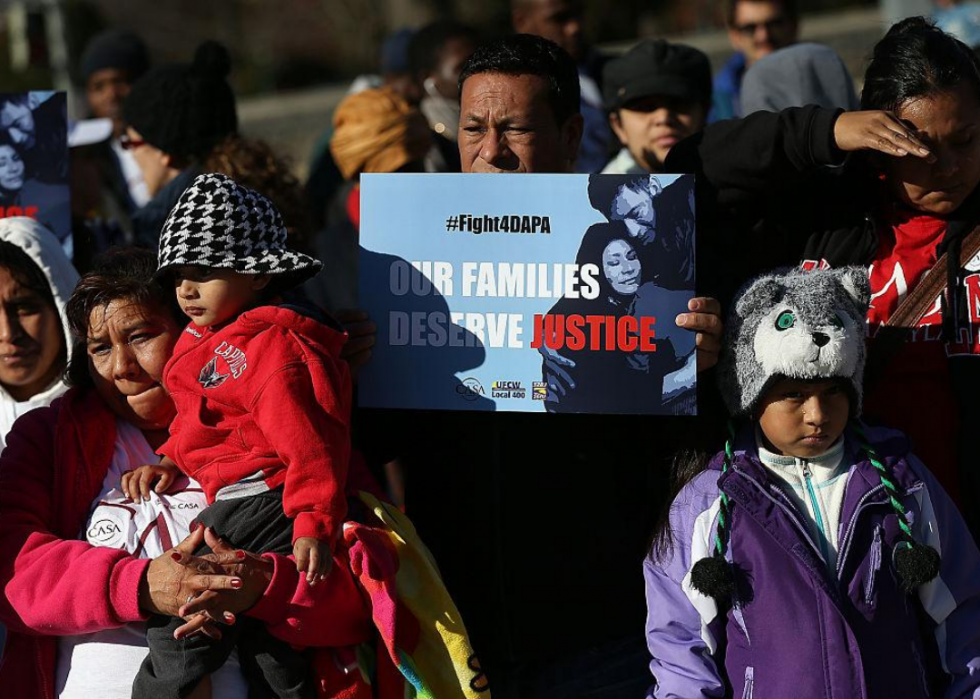
Joe Biden: DACA
Deferred Action on Childhood Arrivals (DACA) was a signature piece of the Obama-Biden administration, and Biden remains fully committed to the program, which allows some immigrants here unlawfully to remain in America if they were brought here by their parents as children. He recently called Trump's attack on the program "cruel" and "un-American," according to Newsweek.
[Pictured: Supporters of immigration reform protest outside the U.S. Supreme Court, Nov. 20, 2015, in Washington D.C.]

Donald Trump: DACA
Trump has worked to end the DACA program as part of his zero-tolerance immigration policy. In June, the Supreme Court rejected the Trump administration’s attempts to terminate the program. In response, the administration vowed to simply stop processing new DACA applications.
[Pictured: A Pro-Trump demonstrator argues with a woman as supporters join the Defend DACA March on Sept. 10, 2017, in Los Angeles.]
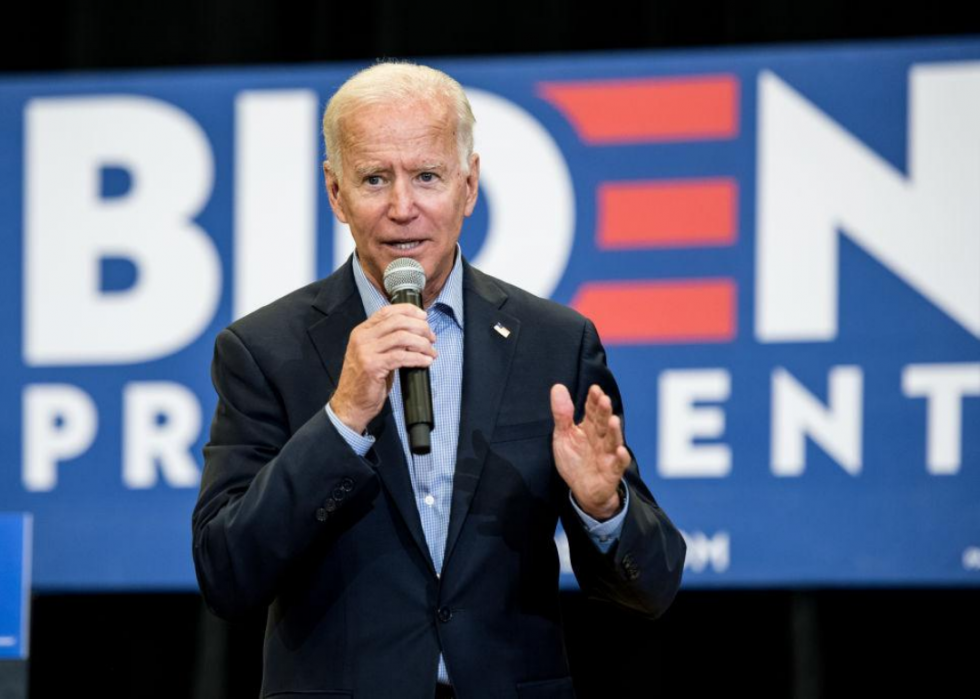
Joe Biden: Foreign aid and diplomacy
Biden has stated as his position is that the United States cannot meet the challenges it faces alone and that strong allegiances with its allies are critical to the country’s success. According to Biden, foreign aid is part of that dynamic, as is full participation in international institutions such as NATO and the United Nations. He has consistently attacked Trump for withdrawing from treaties and eroding relationships with America’s allies.
[Pictured: Joe Biden addresses a crowd at a town hall event in Rock Hill, South Carolina, on Aug. 29, 2019.]
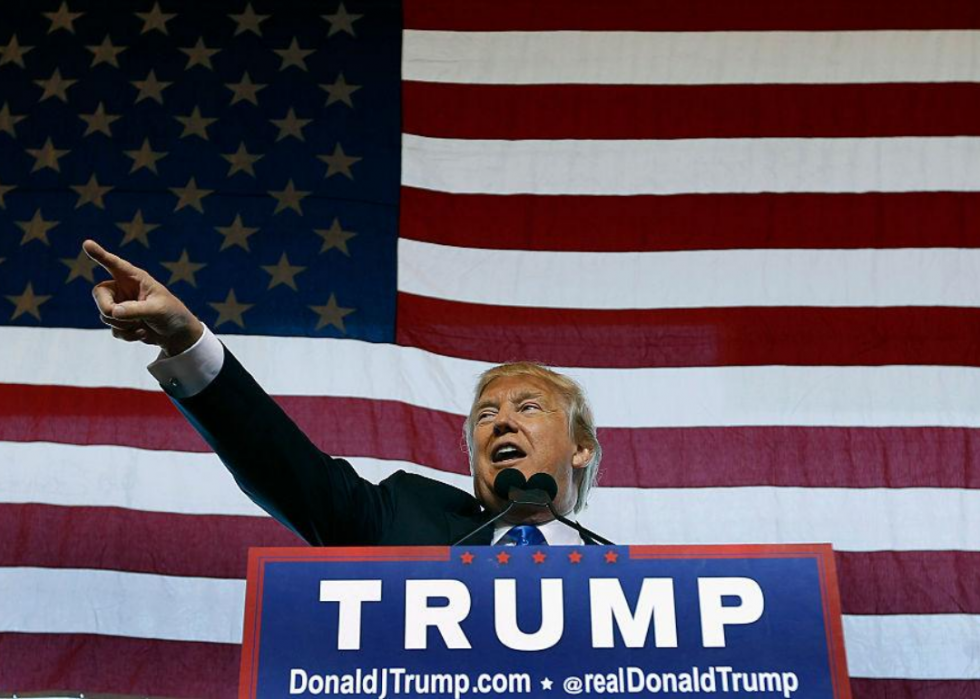
Donald Trump: Foreign aid and diplomacy
From his campaign throughout his presidency, President Trump has condemned many historic international agreements and treaties as being unfair to the United States, who he says carries a disproportionate burden for the benefit of member nations who don’t pull their own weight. He has feuded with many of America’s traditional allies, reduced foreign aid, made aid contingent on recipient nations’ conforming to U.S. policy, attacked entrenched international institutions like the United Nations, and withdrew or threatened to withdraw the U.S. from several major agreements and treaties.
[Pictured: Trump speaks in front of a crowd.]
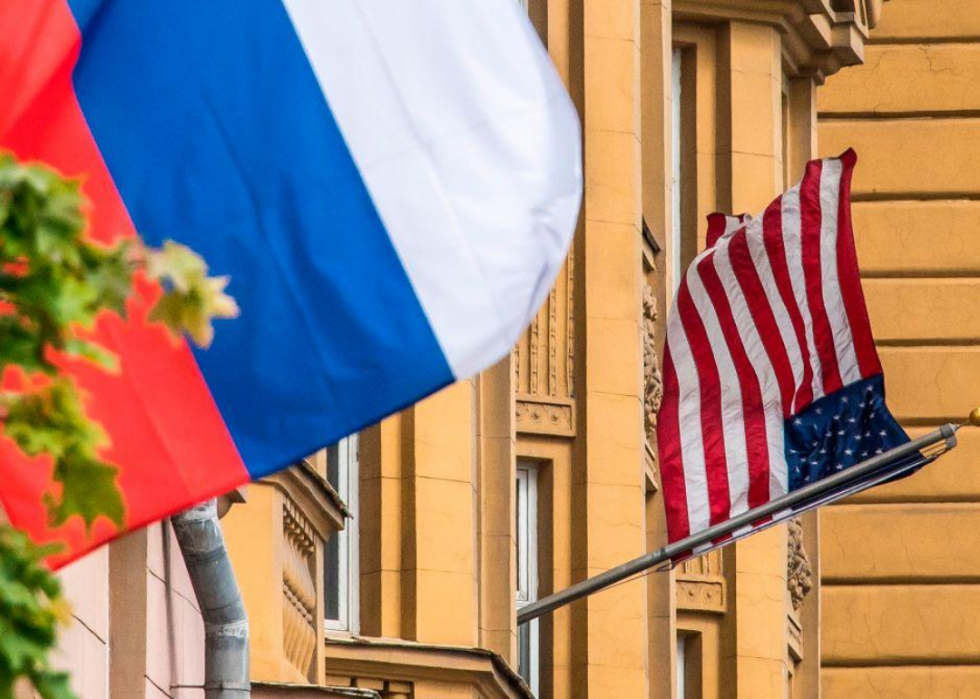
Joe Biden: Russia
Biden agrees with conventional foreign policy wisdom that says Russia is one of the chief adversaries of Western democracy in general and the United States in particular. He believes Russia uses Western banks to launder money and then uses that money to undermine elections in rival nations like the United States. He has also vowed to check what he considers to be a dangerously aggressive escalation in Russian foreign policy.
[Pictured: A Russian flag flies next to the U.S. embassy building in Moscow on July 31, 2017.]
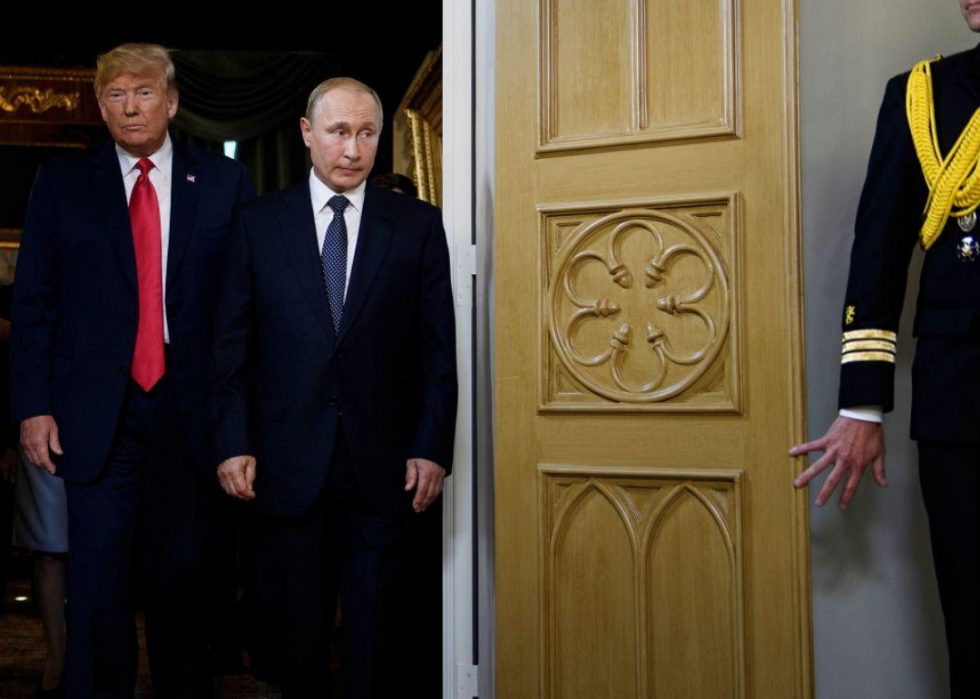
Donald Trump: Russia
President Trump has outraged many foreign policy traditionalists by fostering a cozy relationship with Russian leader Vladimir Putin and called for a more cooperative relationship with Russia. He also sidestepped accusations of not responding to reports that Russia paid bounties to the Taliban to kill U.S. troops in Afghanistan and denies that he cooperated with—or at least didn't attempt to stop—Russia's interference in the 2016 election.
[Pictured: Donald Trump and Vladimir Putin arrive for a meeting in Helsinki, on July 16, 2018.]
You may also like: How Americans feel about 30 major issues


